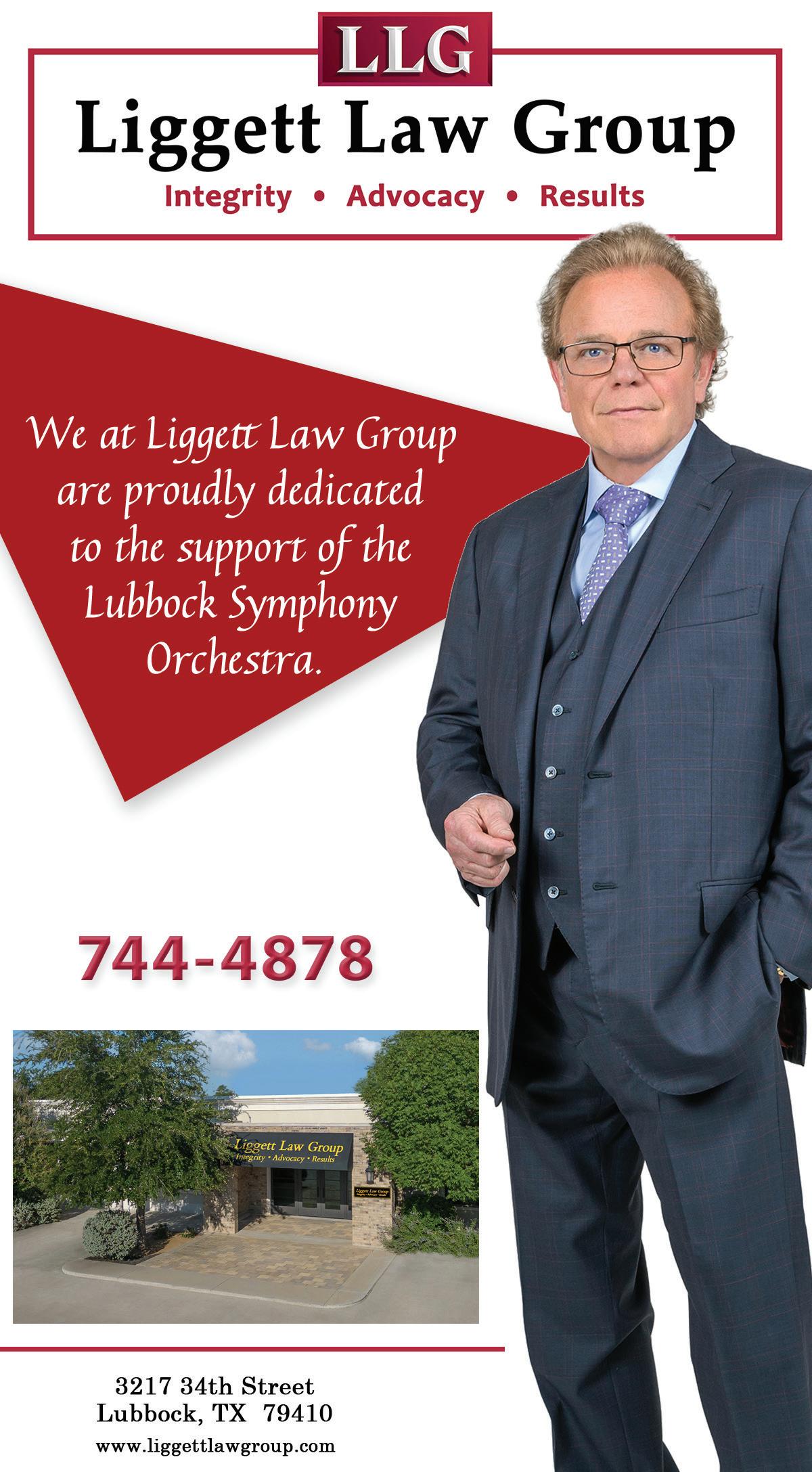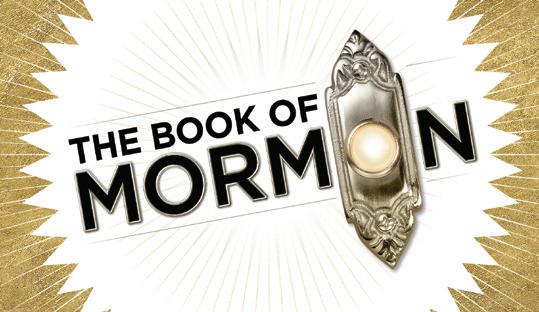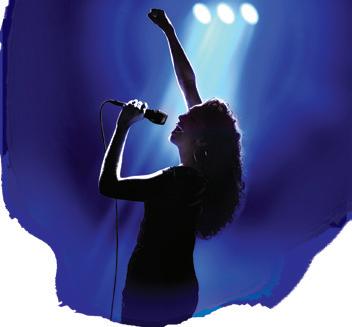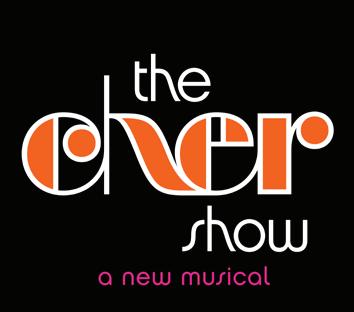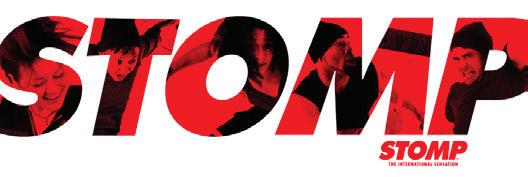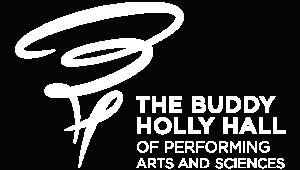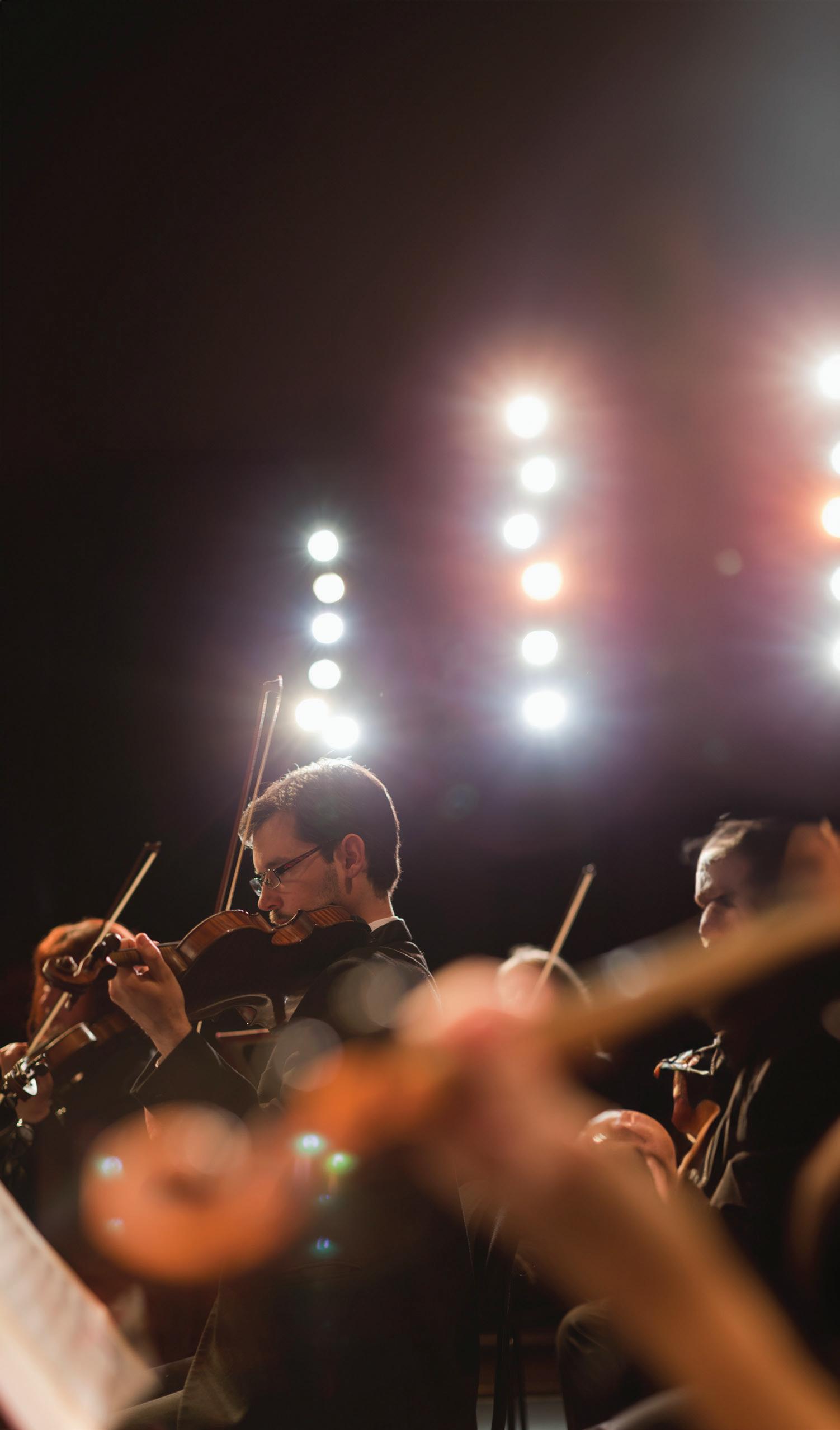




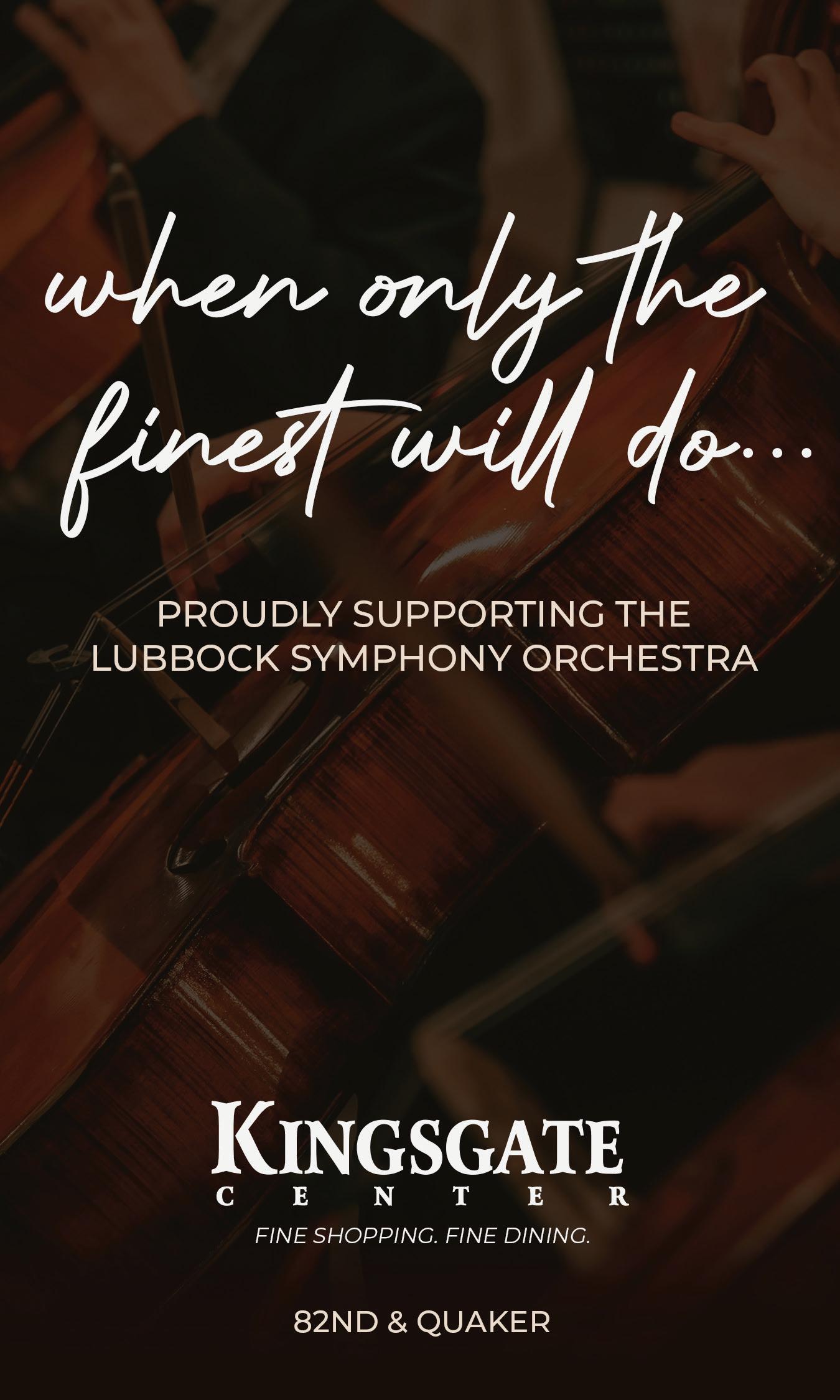
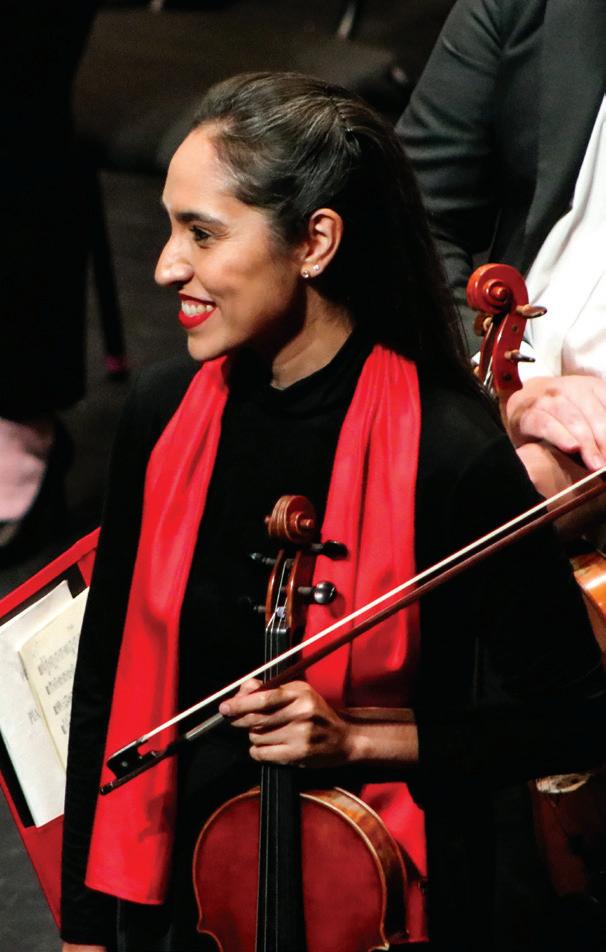
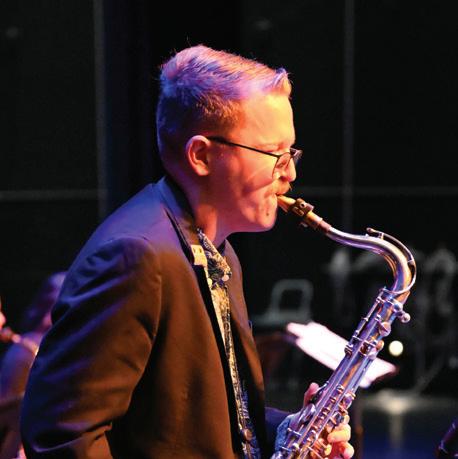
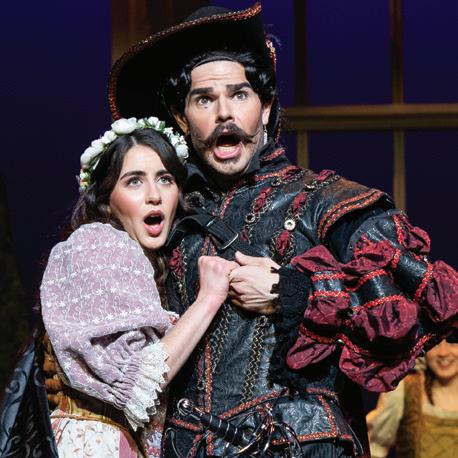


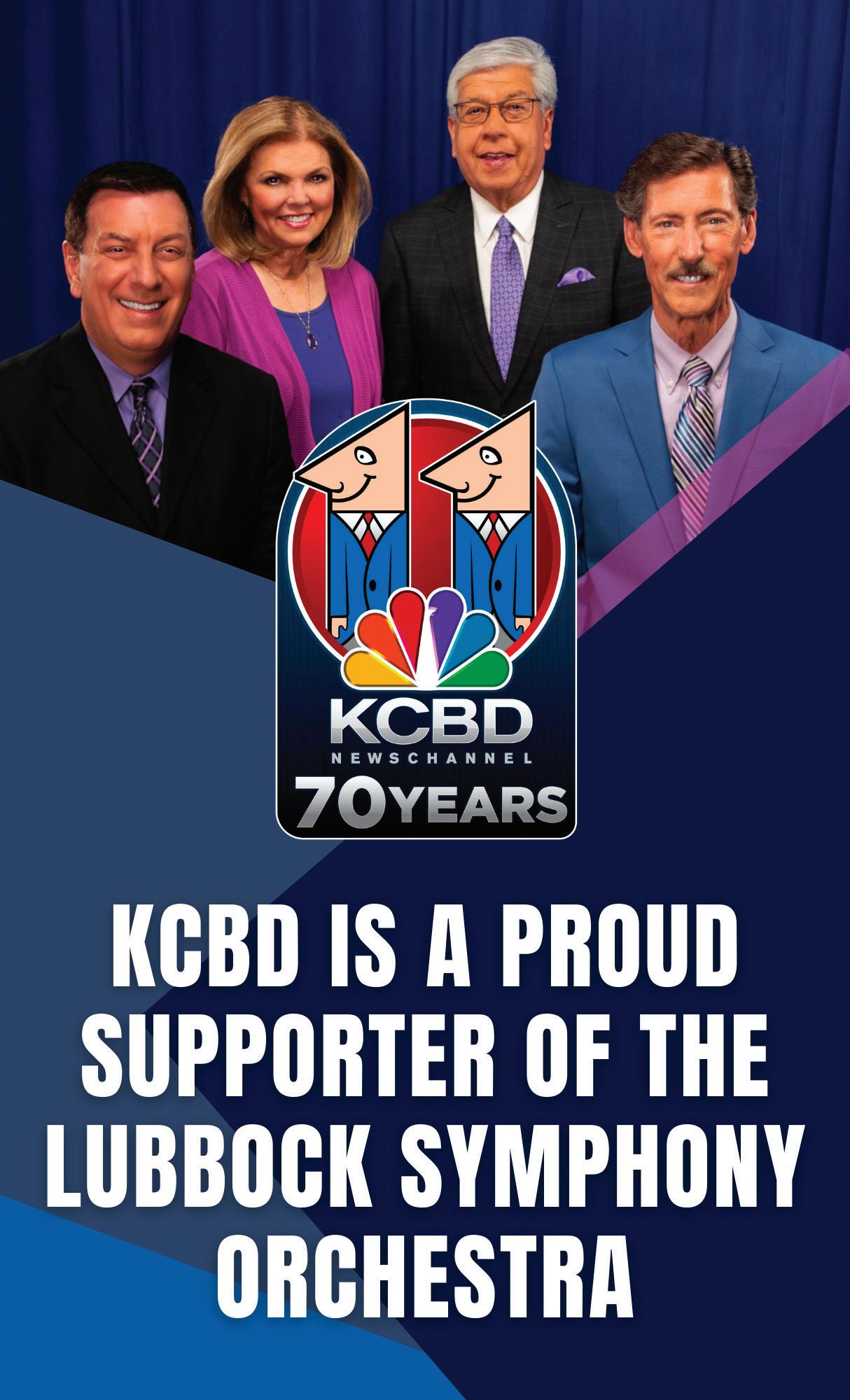














Good evening and welcome to the first Masterworks concert of the 77th season! Our series begins tonight with Rhapsodies, featuring one of Gershwin’s most beloved and recognizable works Rhapsody in Blue. It will be paired with Peter Boyer’s Rhapsody in Red, White & Blue, written to celebrate the centennial of Rhapsody in Blue. Our evening concludes with Beethoven’s Symphony No. 5, one of the best-known compositions in classical music and one of the most frequently played symphonies.
We are pleased to welcome renowned pianist Jeffrey Biegel as our guest artist. Considered one of the most prolific artists of his generation, Mr. Biegel has commissioned many composers to create new music for piano and orchestra. To pay tribute to Gershwin and the 100th birthday of Rhapsody in Blue, Mr. Boyer, at Mr. Biegel’s request, composed Rhapsody in Red, White & Blue. The world premiere was performed by Mr. Biegel and the Utah Symphony this past June. The piece is currently scheduled to be performed by orchestras in all fifty states in the next two seasons.
I want to express my appreciation to tonight’s sponsor City Bank who has been a generous supporter of the Lubbock Symphony for many years. We are indebted to them for their continued funding. Our gratitude also to the Lubbock Symphony Guild, this year’s Debutantes, and their parents.
This evening would not have been possible without the musical brilliance of Maestro David Cho and our extraordinary Lubbock Symphony Orchestra. Thank you for sharing your musical gifts with us! My appreciation to President and CEO Galen Wixson and his dedicated staff for their work on tonight’s program.
Finally, I want to thank all of you, our patrons, for your attendance tonight and continuing interest in and support of the Lubbock Symphony Orchestra.
Best regards,
Toni Wallingford Chair, LSO Board of Directors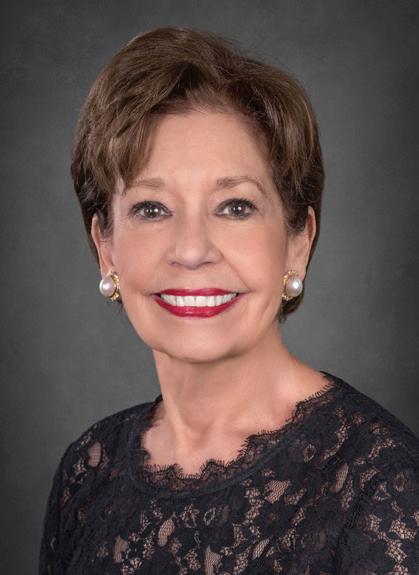

You love Bach in black tie, but have you tried Sibelus in slippers? Beethoven à la bubble bath? Dvořák with your favorite doggo?
Locally-curated classical content is now available via voice command— wherever you are. Just tell your smart device to play KTTZ-HD2, and start that soaker!

Dear Friends of the Lubbock Symphony,
Thank you for joining us for our first Masterworks concert of the 2023-2024 Season! With our season revolving around the “Best Of” symphonic works, tonight features “Rhapsodies” while exploring the known and unknown.
Before the intermission, we celebrate the 100th anniversary of Gershwin’s “Rhapsody in Blue.” Pianist Jeffrey Biegel performs the historic and perennial favorite after introducing us to the new work he commissioned and collaborated on with composer Peter Boyer. “Rhapsody in Red, White & Blue” reflects Gershwin’s form and melodic ideas while celebrating diversity and unity through music. After the intermission, we conclude with Beethoven’s mighty “Symphony No. 5,” also exuding the same enthusiasm and energy as a rhapsody. This daringly virtuosic work is also a great way to help the orchestra get to know each other quickly as we begin the season.
I would also like to extend my gratitude to City Bank for their tremendous support and for sponsoring tonight’s concert.
David Cho Music Director Lubbock Symphony Orchestra

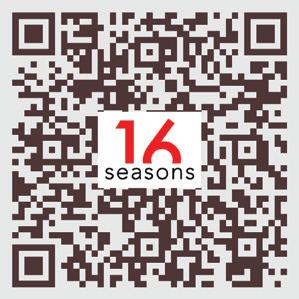
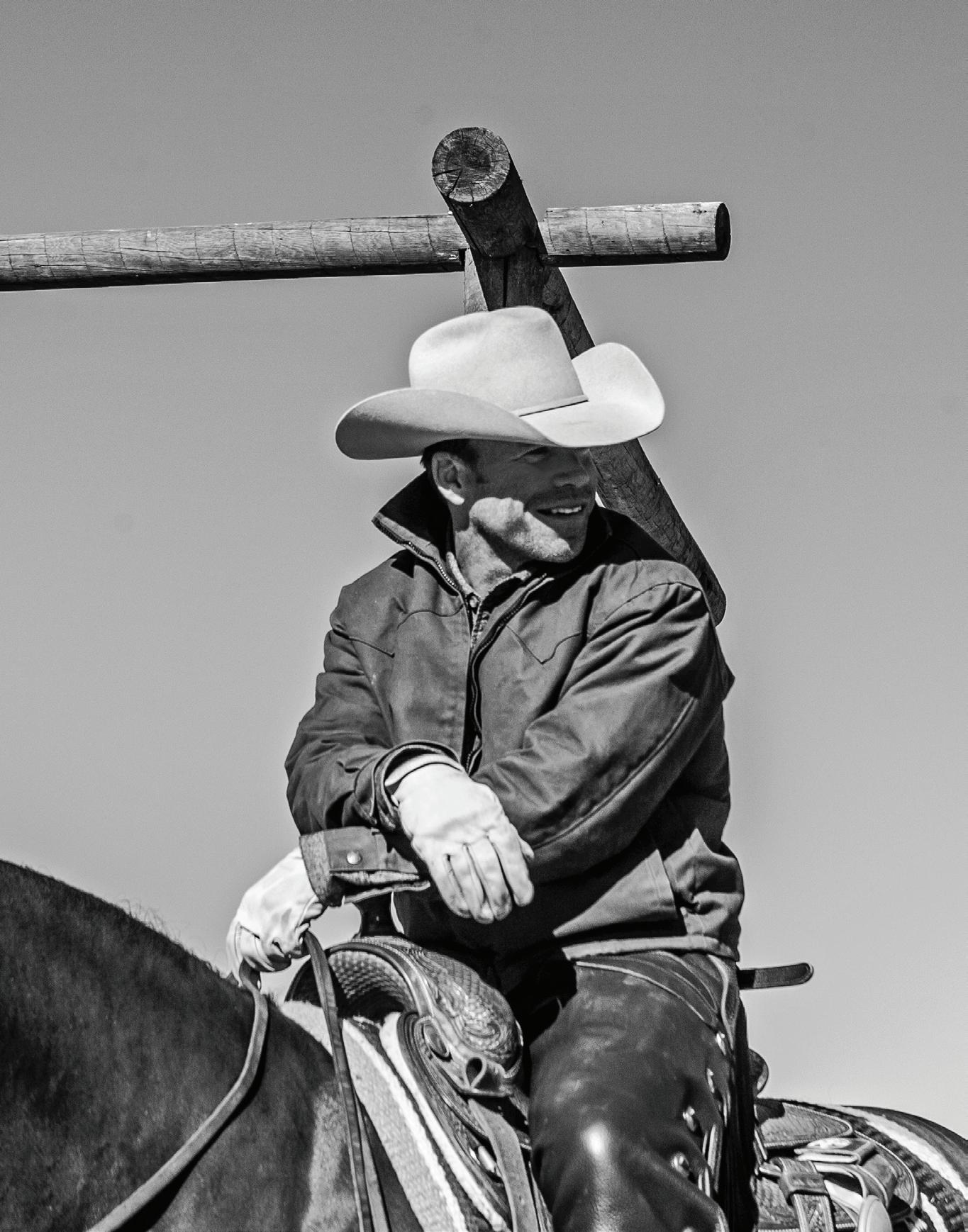

Born in Seoul, Korea, David immigrated to the United States in 1985. David received a variety of music lessons during his childhood in Palos Verdes, California, before focusing his energy exclusively on the piano. He later attended Oberlin College and Conservatory, where he received his Bachelor of Music in piano performance. In 1996, David won the E. Nakamichi Concerto Competition at the Aspen Music Festival and was awarded the Arthur Dann Prize at the Oberlin Conservatory.
In 1999, while acquiring his Master of Music in piano performance at the Peabody Institute at Johns Hopkins University, David was invited by Robert Spano and Seiji Ozawa to attend the prestigious Tanglewood Music Center as a Merrill Lynch Conducting Fellow. David was then invited by Larry Rachleff to study at Rice University, where he served as guest conductor for the Shepherd School Orchestras while acquiring his Master of Music in instrumental conducting. David was subsequently invited by the Vienna Philharmonic to serve as an assistant conductor. As the recipient of the Karajan Fellowship, David has enjoyed residencies at the annual Salzburg Festival in Austria. In 2003, David was invited by Leonard Slatkin to participate in the National Conducting Institute, during which time he made his début with the National Symphony Orchestra at the John F. Kennedy Center for the Performing Arts.
During the 2003-2004 season, David was selected to spend a year as the conducting fellow of the New World Symphony under the mentorship of Michael Tilson Thomas. While on tour with the New World Symphony in New York City, David made his Carnegie Hall début conducting works by Copland and Tchaikovsky. During the orchestra’s Rome tour, David made his début at the Academy of Santa Cecilia, conducting works by Luciano Berio and John Adams. David was then invited by his mentor, Larry Rachleff, to serve as the resident conductor of the San Antonio Symphony Orchestra from 2004-2006. During the 2006-2007 season, David held the Bruno Walter resident conductor chair with the ensemble.
During his tenure as the associate conductor of Utah Symphony | Utah Opera (2006-2011), David won first prize at the Eduardo Mata International Conducting Competition in Mexico City, which resulted in numerous conducting engagements in Europe, Asia, and South America. He has conducted the symphonies of Seattle, Houston, Austin, Memphis, Fort Wayne, Baton Rouge, and Shreveport. He has collaborated with such guests artist as Yo-Yo Ma, Renée Fleming, Joshua Bell, Frederica von Stade, Sarah Chang, Daniel Müller-Schott, Jennifer Koh, Leila Josefowicz, Jennifer Frautschi and Alexander Kobrin. During previous summers, David made appearances at the Aspen Music Festival and the Grand Teton Music Festival.
After heralded guest appearances with the Lubbock Symphony Orchestra in 2007 and 2009, David was appointed as the orchestra’s seventh music director in 2011. He began his tenure with the LSO in the 2012-2013 season and is now actively involved in community engagements.

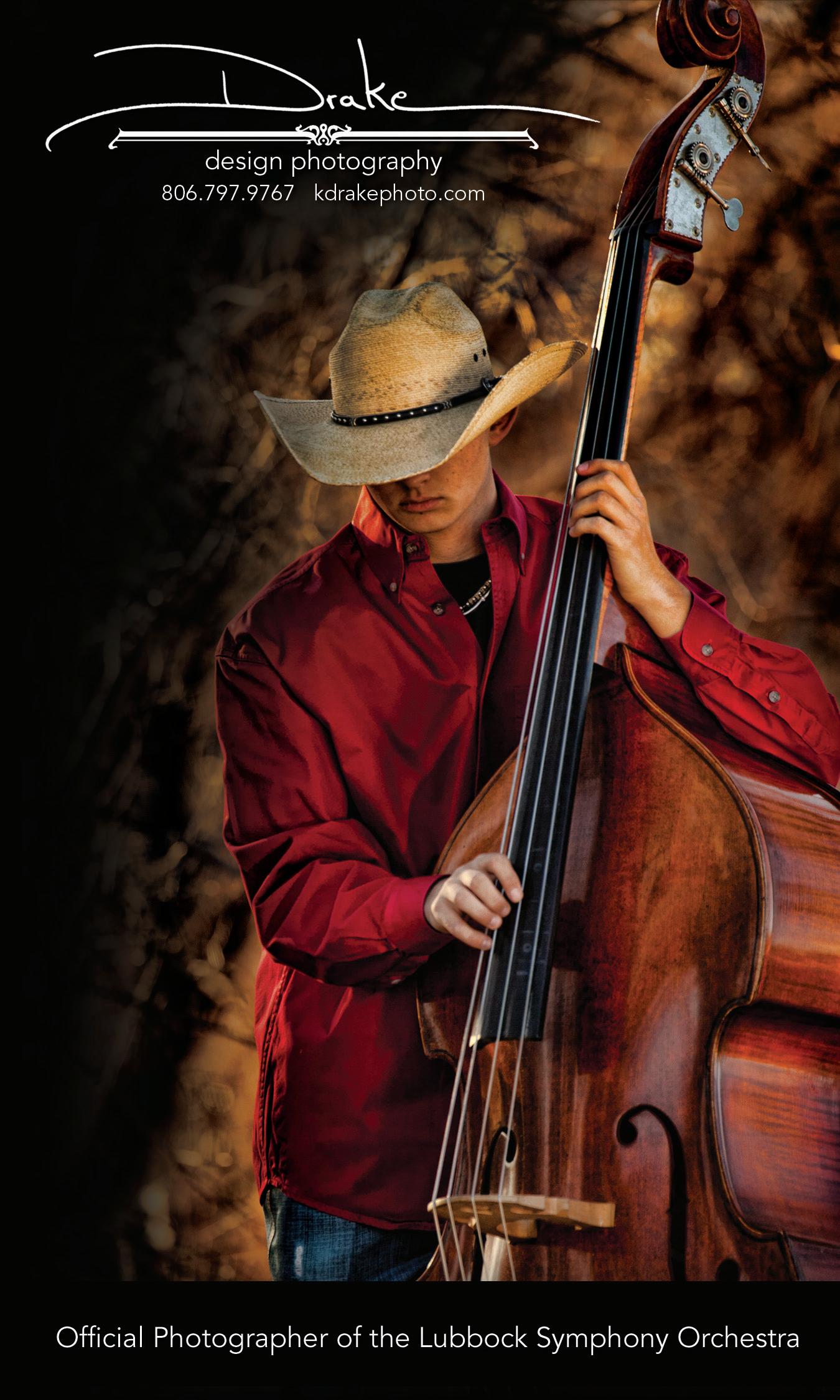



Amy Anderson served as an artistperformer and Associate Professor of oboe at Texas Tech University, where she enjoyed a diverse career as a teacher, recitalist, soloist, and chamber musician. She was an active clinician and performer at conventions of the International Double Reed Society, National Association of College Wind and Percussion Instructors, Texas Music Educators Association, and performed as principal oboe of the Lubbock Symphony Orchestra.
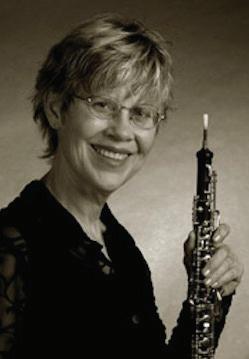
Anderson has appeared in recitals at the Musica no Museu Festival in Rio de Janeiro, Brazil, served on the prestigious Oklahoma Summer Arts Institute faculty, and as principal oboe of the Quartz Mountain Music Festival and the Breckenridge Music Festival orchestras. She has also performed with orchestras in Canada, Florida, Minnesota, and New York, and the Amarillo, Midland-Odessa, San Antonio, and Fort Worth Symphony Orchestras in Texas, as well as professional wind quintets in Florida, Colorado, and New York.
Anderson has recorded for Albany Records and Living Artist Recordings. Her recording of Incantations by Mary Jeanne van Appledorn with TTU pianist William Westney has been featured on Canadian Broadcasting’s Wired for Sound as well as on Texas Public Radio. Prior to joining the faculty at Texas Tech, Anderson was a resident artist at the Banff Centre for the Arts in Alberta, Canada, and held faculty positions at the University of Florida, Luther College, and the Hochstein Music School.
Anderson was awarded the Performer’s Certificate from the Eastman School of Music and holds Bachelor’s and Master’s degrees in Performance from the University of North Texas. Her primary teachers include Charles Veazey and Richard Killmer.
IN HONOR OF WILLIAM A. HARROD
1946-1987
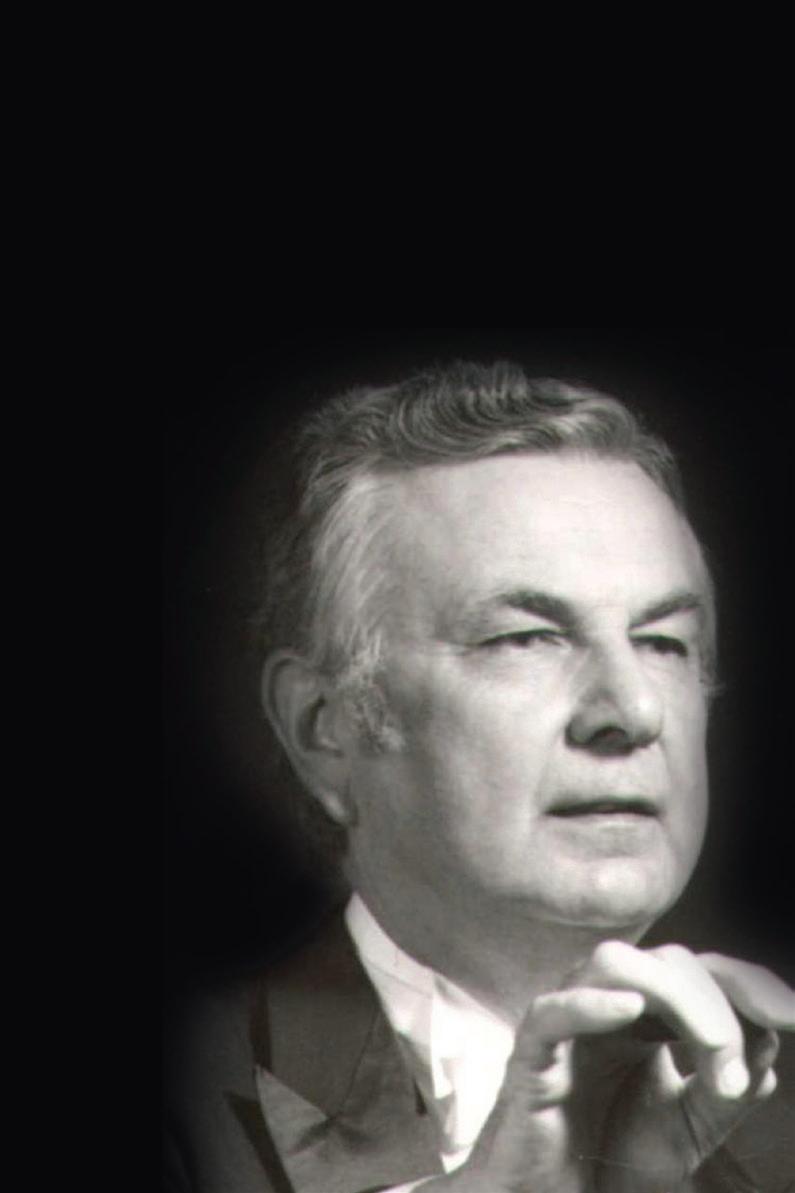
2023 -2 4

Special Guests: West Texas Children’s Chorus

St. John’s United Methodist Church
Dec. 9, 2023 at 7:30 p.m.

Frazier Pavilion
March 2, 2024 at 6:30 p.m.

St. John’s United Methodist Church
April 20, 2024 at 7:30 p.m.


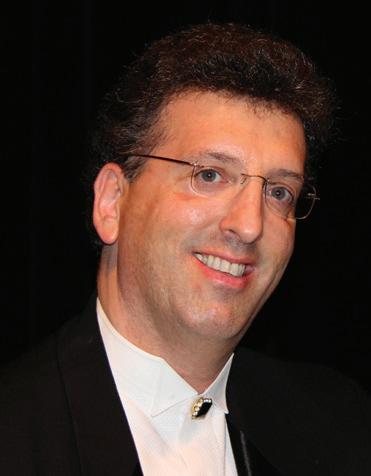
The life and legacy of Jeffrey Biegel reflects an unprecedented journey as a pianist having created the most diverse commissioning projects, premieres and recordings of his generation, building bridges to break divides through music. His life takes its roots from age three, barely able to hear nor speak, until corrected by surgery. The ‘reverse Beethoven’ phenomenon explains his lifelong commitment to music, having heard only vibrations in his formative years. The pandemic year of 2020 focused on composing original “Waltzes of Hope”, “Sonatina”, and “Three Reflections: JFK, RBG and MLK” for solo piano, and for piano and orchestra, orchestrations by Harrison Sheckler. 2021 saw the world premieres of his “Reflection of Justice: An Ode to Ruth Bader Ginsburg” with the Dallas Symphony Orchestra, and Ellen Taaffe Zwilich’s “Remembering Ruth Bader Ginsburg” for mezzo-soprano, piano and orchestra in tribute to the late Supreme Court Justice Ruth Bader Ginsburg, with mezzo-soprano Denyce Graves. Also, the world premiere of Ellen Taaffe Zwilich’s “Shadows” newly arranged for piano and seven players with the Idaho State Civic Symphony. In 2022, he premiered Jim Stephenson’s ‘Piano Concerto’, Daniel Perttu’s ‘A Planets Odyssey’ for piano and orchestra, Farhad Poupel’s “The Legend of Bijan and Manijeh” for piano, orchestra and chorus, his own concerto, ‘Three Reflections: Freedom (JFK), Justice (RBG) Equality (MLK)’, and Christopher Marshall’s ‘Thanksgiving Variations on “We Gather Together”’. For 2023, world premieres of Peter Boyer’s “Rhapsody in Red, White & Blue” and Grammy winning singer/songwriter, Melissa Manchester’s ‘AWAKE’ for piano and orchestra will take the stages across America. The 2024-25 season foresees a new work for piano and orchestra by Adolphus Hailstork with the Pacific Symphony, Carl St. Clair conducting.
Considered the most prolific artist of his generation, Moravian College in Bethlehem, PA, conferred the Honorary Degree of Doctor of Humane Letters upon Mr. Biegel in 2015, for his achievements in performance, recordings, chamber music, champion of new music, composer, arranger and educator. In 2019, Kenneth Fuchs’s “Piano Concerto: ‘Spiritualist’” with the London Symphony Orchestra led by JoAnn Falletta received a Grammy Award for Best Classical Compendium, featuring Mr. Biegel as its soloist. In 2019, the first digital recordings were released on Mr. Biegel’s Naturally Sharp label: “Cyberecital: An Historic Recording”, “A Pianist’s Journey”, and the September 2021 release of George Gershwin’s “Rhapsody in Blue” 1924 version with the Adrian Symphony Orchestra, Bruce Kiesling conducting.
Mr. Biegel created the first largest consortium of orchestras in 1998 for Ellen Taaffe Zwilich’s ‘Millennium Fantasy’ premiered with the Cincinnati Symphony Orchestra in 2000, followed with Charles Strouse’s ‘Concerto America’ with the Boston Pops, Lowell Liebermann’s ‘Concerto no. 3’ with the Milwaukee Symphony Orchestra, William Bolcom’s ‘Prometheus’ for piano, orchestra and chorus, with the Pacific Symphony and Pacific Chorale, Richard Danielpour’s ‘Mirrors’ with the Pacific Symphony, Ellen Taaffe Zwilich’s ‘Shadows’ with the Louisiana Philharmonic Orchestra, Jake Runestad’s ‘Dreams of the Fallen’ with the Louisiana Philharmonic Orchestra and Symphony Chorus of New Orleans, Lucas Richman’s ‘Piano Concerto: In Truth’ with the Knoxville Symphony Orchestra, recorded with the Pittsburgh Symphony Orchestra, and Kenneth Fuchs’s “Piano Concerto: ‘Spiritualist’” with the Springfield Symphony Orchestra (MA). He also premiered and recorded Giovanni Allevi’s ‘Concerto for Piano and Orchestra’ and commissioned Christopher Theofanidis’s “Concerto no. 2 for Piano and Orchestra” with the Harrisburg Symphony Orchestra, the “Peanuts Concerto” by Dick Tunney, based on music by Vince Guaraldi, Jimmy Webb’s ‘Nocturne for Piano and Orchestra’ and, PDQ Bach’s ‘Concerto for Simply Grand Piano and Orchestra’ by Peter Schickele with the Colorado Symphony Orchestra. Bringing new music to youth orchestras saw the world premiere of Daniel Dorff’s ‘Piano Concerto’ with the Etowah Youth Orchestra, conducted by Michael Gagliardo.
He studied at The Juilliard School with Adele Marcus, herself a pupil of Josef Lhevinne and Artur Schnabel, and is currently on faculty at the Conservatory of Music at Brooklyn College.






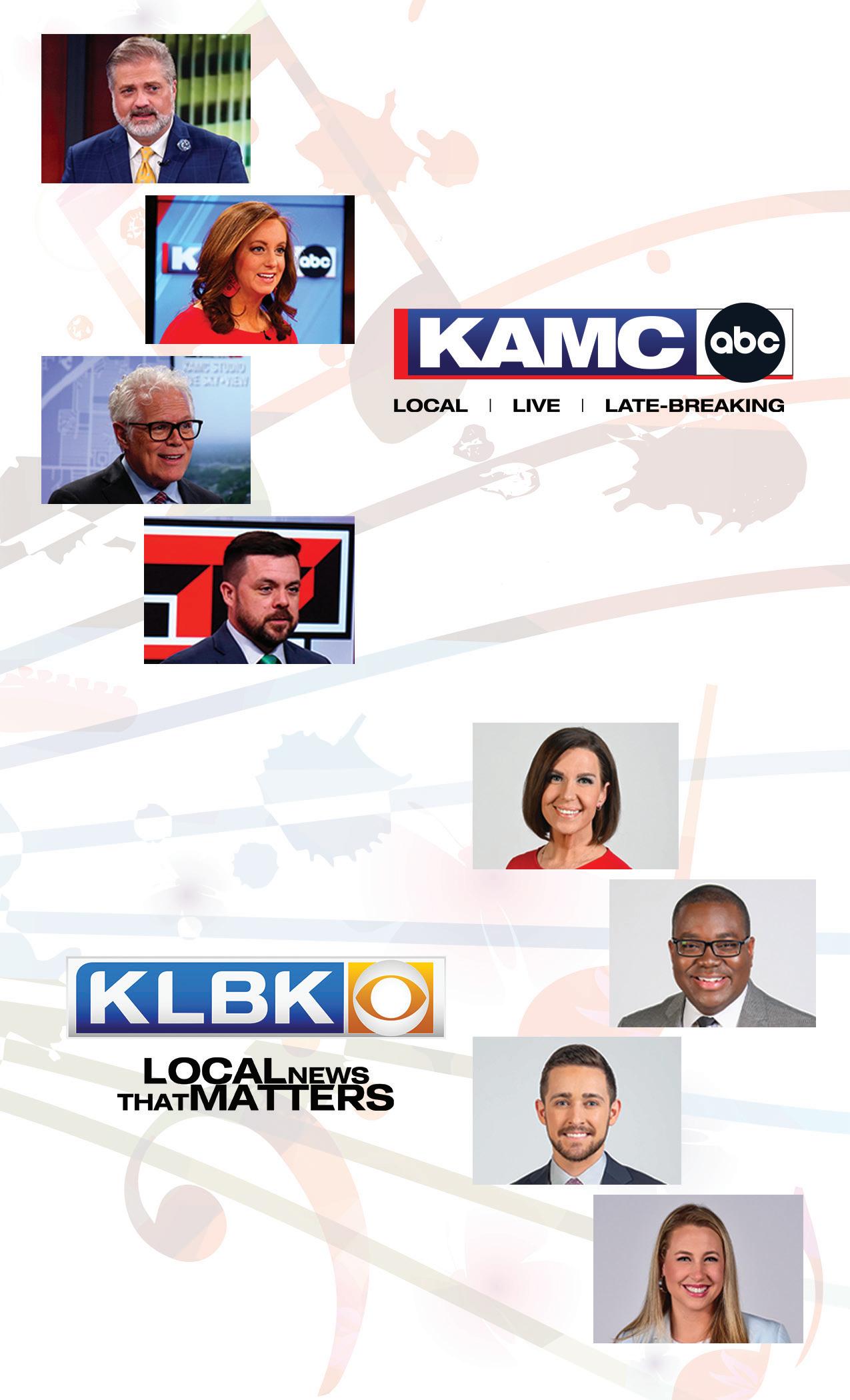

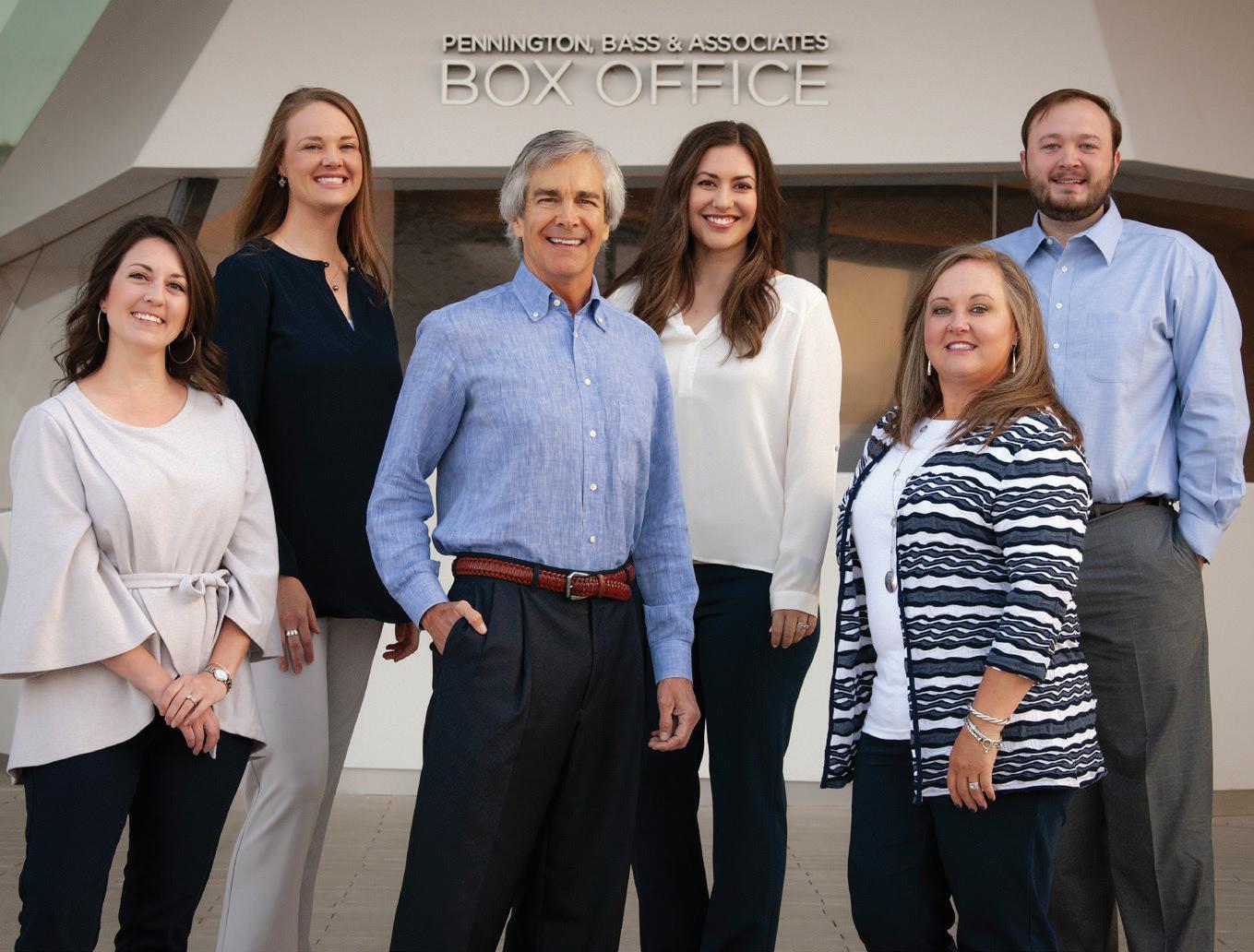
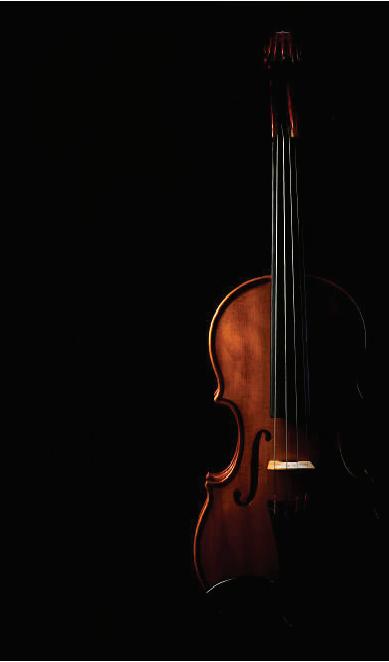

David Cho
The CH Foundation Endowed
Conductor’s Podium
Annie Chalex Boyle
Concertmaster
Jones-Saathoff Family
Endowed Chair
Linda Lin
Associate Concertmaster
Diekemper Family Foundation
Endowed Chair
Lazaro Gonzalez
Grace Marín Aguilar
Isaías Lopes Ferreira
Rodrigo Cardona
Texas Tech University School of Music Endowed Performer
Judy Woody
Adan Flores
Kea Beasley
Saikat Karmakar
Principal
Justice Phil and Carla Johnson
Endowed Chair
Brennan Lowrey
Martha Perez
James Ellis
Shirley Wigley
Cassidy Forehand
Shawn Earthman
Nilschmid Jimenez
Savannah Sharp
Israel Mello Principal

Mary M. Epps and Ralph E.
Wallingford Endowed Chair
Sera Jung
Bruno Silva
Ryellen Joaquim
Travis Springer
Michael Newton
Principal
Mary Francis Carter Endowed Chair
Madeline Garcia
Neemias Santos
Daria Mi Ś kiewicz
Yuhan Shi
Melita Hunsinger
Mark Morton Principal
Eugene and Covar Dabezies
Endowed Chair
Griff Miller
Stuart Anderson
Christopher Arcy
Gregory Faught
Zongyuan Wei
Kim Hudson
Principal Crew of Columbia, STS-107
Endowed Chair
Eric Leise
Spencer Hartman
Kathleen Carter Bell
Principal
Lubbock Symphony Guild Principal
Oboe Endowment
Susetta Rockett
Susetta Rokett
Principal
Janeen Drew Holmes Endowed Chair
CLARINET
David Shea
Principal
Christine Polvado and John Stockdale Endowed Chair
Trisha Burrell
BASS CLARINET
Ryan Rodarte
ALTO SAXOPHONE
David Dees
Natalie Wilson
TENOR SAXOPHONE
Christine Ewald
BASSOON
Adam Drake Principal
Nancy and Tom Neal
Endowed Chair
Ian Resurreccion
CONTRABASSOON
Adolfo Mendoza
HORN
Vivian Yu-hsuan Chang Principal
Anthony and Helen Brittin
Endowed Chair
David Lewis
Lucian Hutchinson
John Stacy
William Wallace
TRUMPET
Joe Vandiver Principal
Stacey and Robert Kollman
Family Endowed Chair
Scott Strovas
Matthew Soares
TROMBONE
Bruce Keeling
Principal
Larry and Lucy Landusky
Endowed Chair
Haotian Quan
BASS TROMBONE
Darin Cash
Tim and Mary Jane Sampson
Endowed Chair
TUBA
Arturo Galvan Principal
Diekemper Family Foundation
Principal Tuba Endowment
TIMPANI
Michael Mixtacki Principal
Lubbock Symphony Guild
Endowed Chair
PERCUSSION
Taylor Burks
Principal
Lisa Rogers/Alan Shinn
Endowed Chair
Mariah Taller
Kyle Buentello
PAGE-TURNER
Gregory Tufts
LIBRARIAN
Vaughan Hennen


THE ACTIONABLE SIDE OF YOUR IT NEEDS
PROUD SUPPORTER AND SERVICE PROVIDER OF THE LUBBOCK SYMPHONY
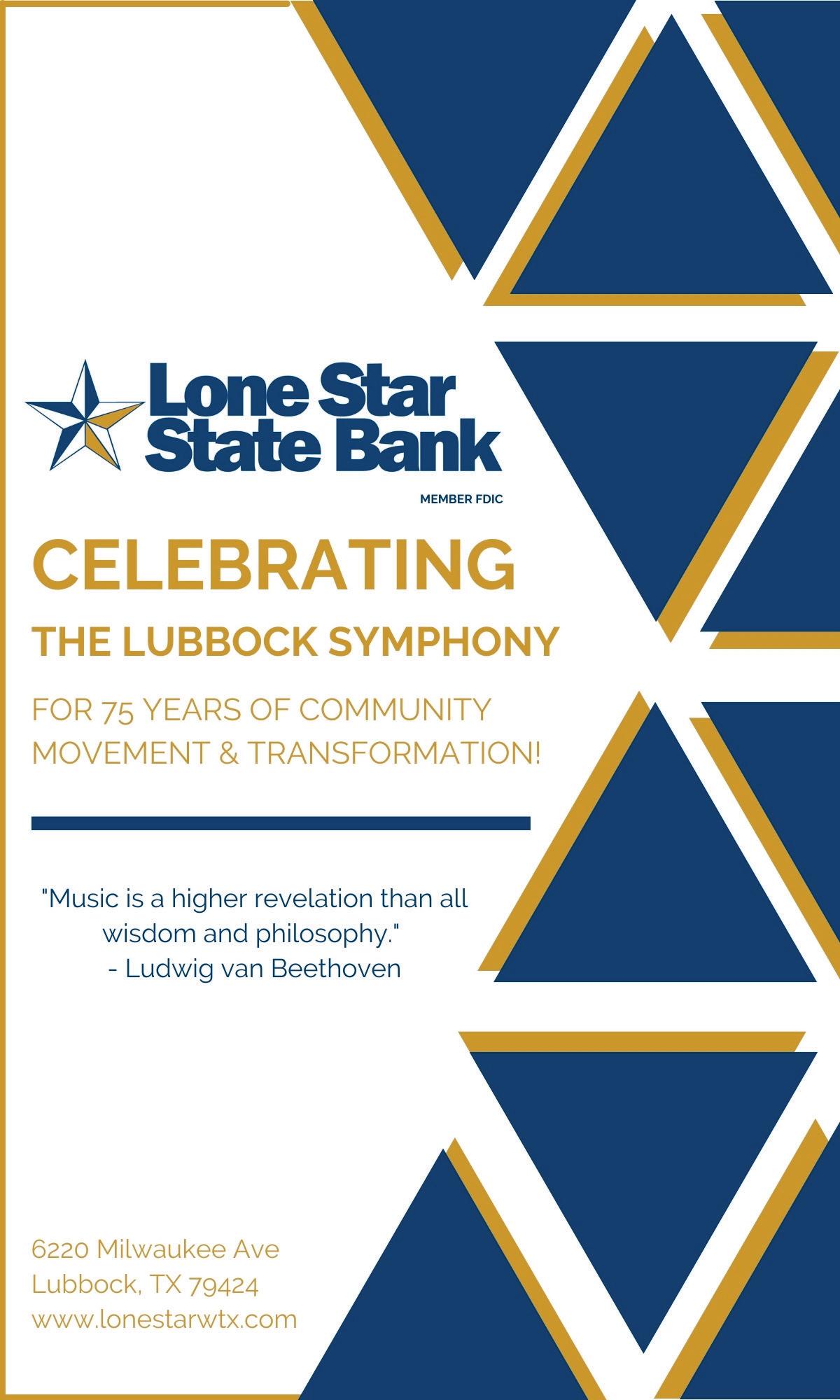
A work written to commemorate the 100th anniversary of George Gershwin’s Rhapsody in Blue.
Commissioned by tonight’s pianist, Jeffrey Biegel.
Composer Peter Boyer has written numerous patriotic works, including the oratorio Ellis Island: A Dream of America.
Serves a tribute and a reflection of Gershwin’s Rhapsody in Blue, with echoes of both the form and the melodic ideas of Gershwin’s music.
Gershwin found out he was writing the piece by reading about it in the New York Tribune only one month before the premiere.
Gershwin wrote it while traveling back and forth to Boston for a production of his musical Sweet Little Devil. He said the rhythms of the train inspired the shape of the piece.
Beethoven’s Fifth Symphony was used as an intergalactic greeting card, with recordings sent onboard the Voyager 1 and 2 spacecraft.
An entire symphony based on only four notes – three short, one long. The four-note rhythm is heard relentlessly in the first movement, but appears in all four movements

The symphony includes many unique features: the first use of piccolo, contrabassoon, and trombones in a symphony orchestra (all in the last movement).
Part of the symphony’s enduring popularity is its journey from darkness and tragedy to light and triumph, making it one of the first symphonies of the Romantic era.
We hope you were able to participate in ClefNotes with John Clare prior to the concert this evening!
The first Native American to lead an all-classical radio station, John Nasukaluk Clare is comfortable behind a microphone, streaming video or playing violin. He is currently the Classical Music Director at WGUC in Cincinnati, and is the weekday morning drive host on SiriusXM’s Symphony Hall. In 2005, he earned the Deems Taylor Award from ASCAP for radio broadcasting, citing his work on 20/20 Hearing. An avid chamber music lover, Clare founded the Las Vegas Chamber Music Society in 2004.
Join us before “Oratorio” for another beginner-friendly discussion with John Clare!
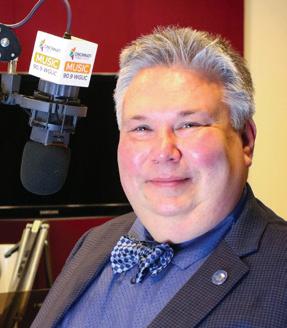
18 minutes
Rhapsody in Red, White
Jeffrey Biegel, piano
19 minutes
Rhapsody in Blue
Jeffrey Biegel, piano
15 minutes
15 minutes
33 minutes




Symphony No. 5 in C minor, op. 67
I. Allegro con brio
II. Andante con moto
III. Scherzo: Allegro
IV. Allegro - Presto


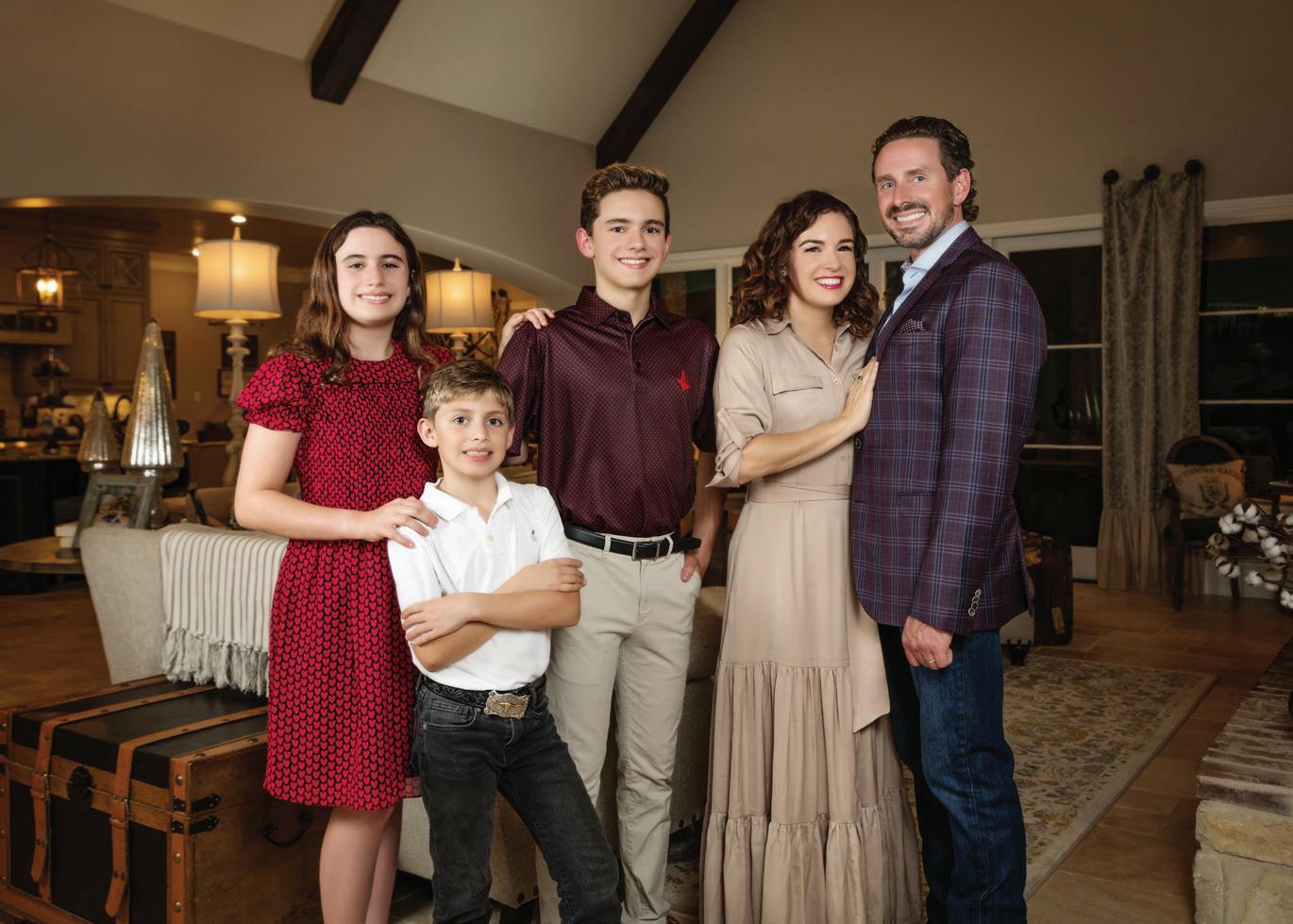

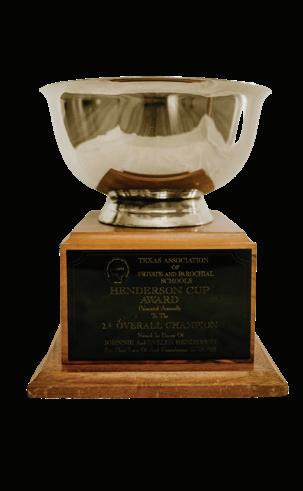
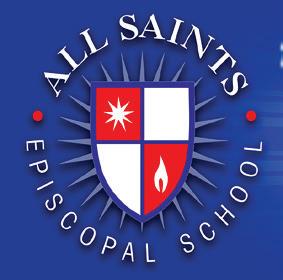

In 2017, pianist Jeffrey Biegel wanted to find a way to commemorate the 100th anniversary of George Gershwin’s Rhapsody in Blue, which was first performed in March of 1924 at Carnegie Hall. He wanted to do more than repeatedly perform Gershwin’s iconic work for piano and orchestra, so he came up with the idea of commissioning a composer to write a companion piece for Rhapsody in Blue, with the commission encompassing as many orchestras around the country as possible. With that, Biegel began the Rhapsody Initiative to jump start a nationwide celebration of a work that forever changed the way Americans and American orchestras thought about both jazz and classical music.
Biegel himself had this to say about the creation of the piece:
I had been thinking about how to celebrate the centennial since 2017, and a couple of years later I started thinking about getting out a new piece, and I came up with this title, Rhapsody in Red, White & Blue. I felt the country needed to join hands through music, despite all the divisions and differences. So I thought, why not celebrate being an American, and celebrate ‘Rhapsody in Blue’ with a new ’Rhapsody.’
After contacting several composers, Biegel eventually decided upon Peter Boyer, a composer of numerous patriotic works, including the oratorio Ellis Island: The Dream of America. After extending the commission to Boyer, Biegel began the arduous task of raising money for the project and bringing other orchestras on board from around the country, with the goal of having orchestras participate from all fifty states. Though his efforts were slowed by COVID-19, he continued to work even as orchestras shut their doors for the duration of the pandemic.
Biegel described his goals in recruiting orchestras for this new work:
Many had suffered loss of money and other setbacks, so I though the idea would be a generous incentive for orchestras to join hands together and celebrate our diversity through our unity. And little by little other orchestras began to join…We have a youth orchestra on board, and a number of community orchestras as well. I’m also working with some universities as well…I’d love to get all 50 states on board by June 30 (the date of the world premiere).
The first performance of Rhapsody in Red, White & Blue was given on June 30, 2023 at the Deer Valley Music Festival in Park City, Utah, by the Utah Symphony Orchestra conducted by Benjamin Manis with Jeffrey Biegel as the soloist. The work is both an homage and a reflection of Gershwin’s Rhapsody, with echoes of that work and the seductive Afro-Cuban rhythms that Gershwin absorbed in works like his Cuban Overture.
Jeffrey Biegel’s commission now includes 46 different orchestras and it appears that the Rhapsody Initiative will soon reach its goal of including orchestras in all fifty states. Conceived and created during a national pandemic, Biegel believes that the work will inspire composers and listeners for years to come:

This is something much greater than ourselves. I tell composers that this isn’t about me, and it’s not about them. This is about working together to help bring new music to the repertoire for future generations.
Material for notes on Rhapsody in Red, White & Blue courtesy of propulsivemusic. com, jeffreybiegel.com and parkrecord.com
George Gershwin: Rhapsody in Blue
Motivation and inspiration are different for every composer. For George Gershwin, the stimulus for writing his famous Rhapsody in Blue was very simple but startling: he found out that he was writing it by reading about it in the newspaper. In early January 1924, Gershwin and his brother Ira were whiling away a few hours shooting pool, when Ira came across an article in the New York Tribune announcing an upcoming concert by bandleader Paul Whiteman. The two brothers were astonished to read that, according to Whiteman, “George Gershwin is at work on a jazz concerto, Irving Berlin is writing a syncopated tone poem, and Victor Herbert is working on an American suite.” What was of far greater concern to Gershwin was the date of the concert: February 12, slightly more than one month hence.
Anxious that Whiteman had never discussed such a project with him, Gershwin phoned the bandleader the following morning to try to clarify the situation. While Whiteman admitted that he had been forced to move the concert up several months because of a similar project being developed by a rival, he tactfully reminded Gershwin that they had discussed the possibility of a jazz concerto two years previously when they collaborated on the Broadway review George White’s Scandals of 1922.
Rather than hurl recriminations, Gershwin decided that a gig was a gig and sat down with Whiteman to create a piece suitable for both their purposes. Gershwin insisted that the looming concert date necessitated a shorter work than a traditional concerto, so they agreed on a loosely structured fantasia featuring Gershwin as the piano soloist. In the interests of time, Whiteman proposed turning the task of orchestrating the Rhapsody over to Ferde Grofé, chief orchestrator for the Whiteman band. Grofé was an excellent composer in his own right, best known to concert audiences for his Grand Canyon Suite. Gershwin agreed, and Grofé was “on call” to Gershwin for the next month, orchestrating the Rhapsody as he received new pages from the composer’s hands.
Gershwin had the added stress of working around several other pending musical projects while rushing to compose the Rhapsody. Evidently all his multitasking paid off, for it was during a train trip to Boston for rehearsals for his new musical Sweet Little Devil that Gershwin received an epiphany about the musical form of the Rhapsody. He later wrote:
It was on the train, with its steely rhythms, its rattlety-bang that is often so stimulating to a composer. . . And there I suddenly heard—and even saw on


Market Street knows the art of creating lives in all of us and loves to support local arts and entertainment.
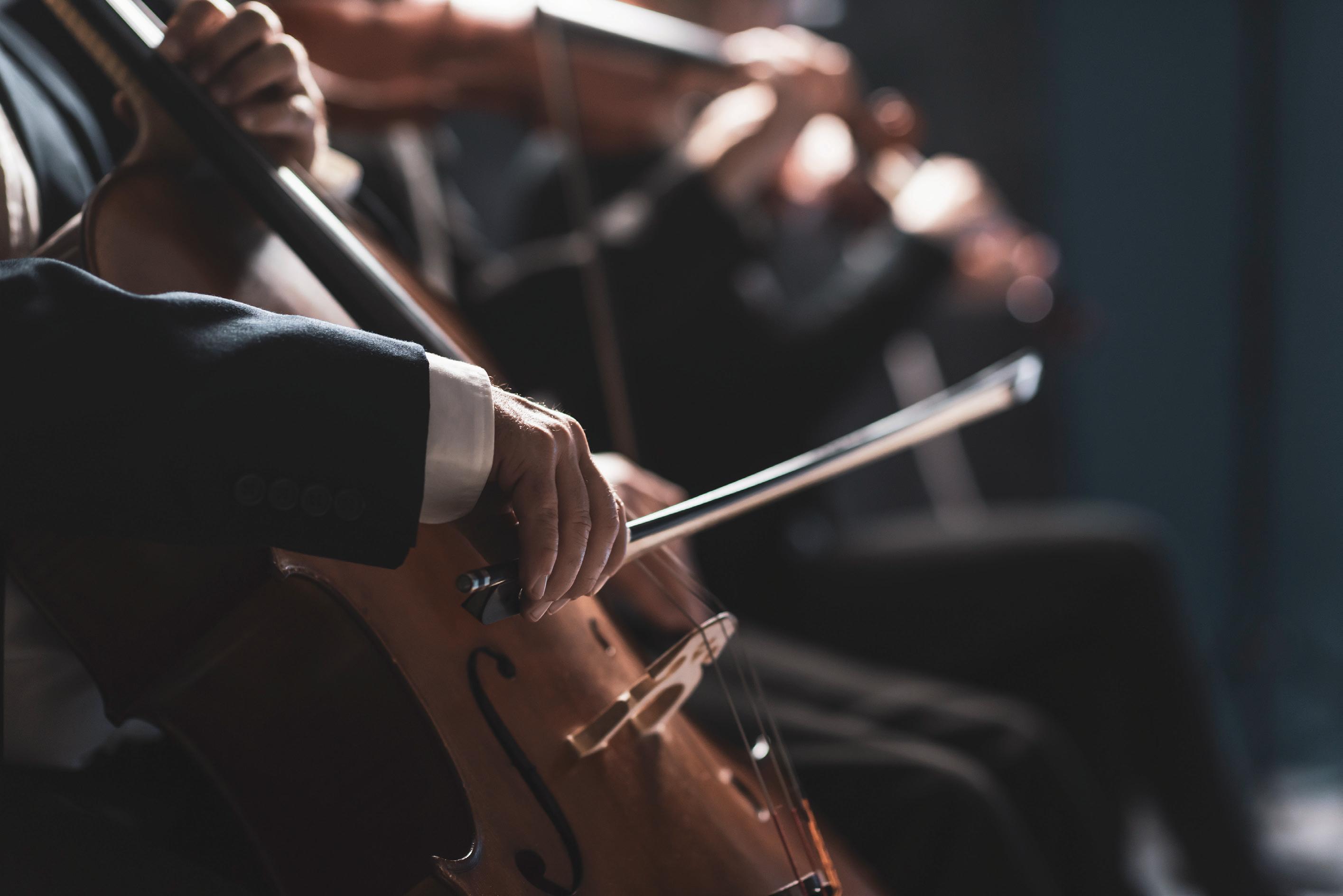
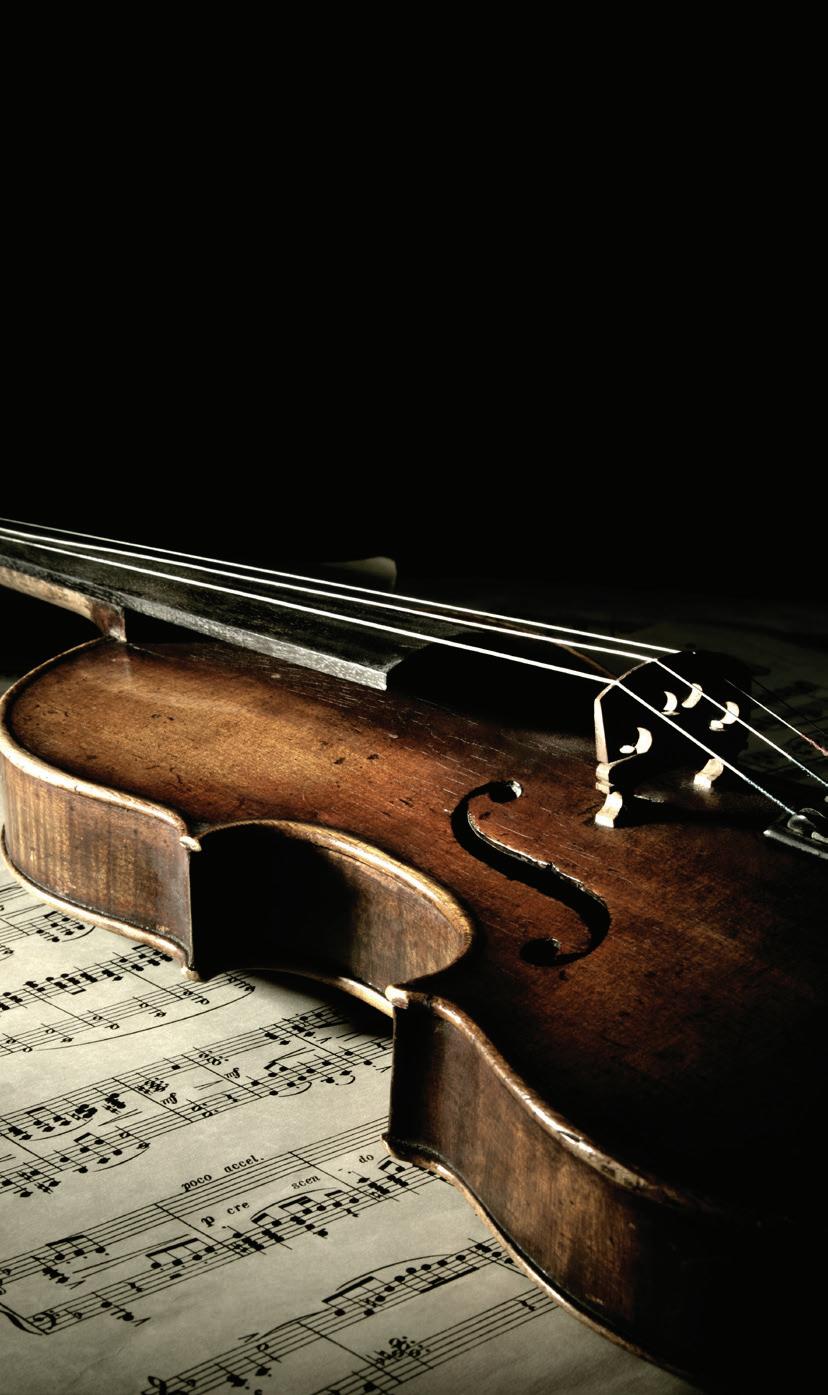
paper—the complete construction of the rhapsody, from beginning to end. . . I heard it as a sort of musical kaleidoscope of America—of our vast melting pot, of our unduplicated national pep, of our metropolitan madness. By the time I reached Boston I had a definite plot of the piece, as distinguished from its actual substance.
Originally the famous clarinet glissando that opens the Rhapsody wasn’t a glissando at all. Gershwin had notated a trill, followed by an upward chromatic scale. In the usual manner of musicians fooling around in rehearsal when playing new music, Ross Gorman, Whiteman’s clarinetist, took the scale and turned it into the “shmear” we know today, part of the piece’s unique performance tradition.
The work is loosely structured, stringing together contrasting jazzy episodes with improvisatory piano cadenzas. After the central cadenza, Gershwin introduces a beautifully lyrical theme that would be equally at home on Broadway or in a Romantic piano concerto. At the Rhapsody’s conclusion, Gershwin brings us full circle, with piano and orchestra proudly strutting their way to the brash, bluesy conclusion.

Just four notes: three short, one long.
Four notes in unison, without harmony, stated with unquestionable authority, the brief silence that follows them crackling with tension. So incredibly simple, and yet arguably the most famous four notes in the history of music on our planet, recognizable by everyone from kindergarten students to octogenarians. Four notes that the composer himself purportedly described as “Thus Fate knocks at the door.” Four notes that, over a century later, rallied the world’s democracies against the impending peril of fascism, in Winston Churchill’s famous “V for Victory” symbol (so called not just for the Prime Minister’s two-fingered gesture, but because that rhythm – three shorts and a long – represents the letter ‘V’ in Morse code), given an audio equivalent by the BBC in those four notes. Four notes so indestructible in their commanding proclamation that they survived the assault of the disco age (in the guise of Walter Murphy’s 1976 chart topper A Fifth of Beethoven) and have retained their power and brilliance even when gang-impressed to hawk products ranging from computer processors to frozen pan pizza.
As a civilization, we hold Beethoven’s Fifth Symphony in such high regard that we made it part of our calling card to other worlds. The Golden Record, the goldplated disc of the music of our planet included on both the Voyager 1 and Voyager 2 spacecraft, includes a recording of the first movement of the Beethoven Symphony No. 5, cheek-by-jowl with recordings of Peruvian panpipes, Javanese gamelan, Indian ragas, Louis Armstrong, and Mississippi blues, as well as music by Bach, Mozart, and Stravinsky. That recording (by the Philharmonia Orchestra under the baton of Otto Klemperer) is currently streaking through interstellar space at about 10 miles per second at a distance of roughly 13 billion miles from Earth, sent with the fervent hope that another civilization will be able to hear
those four notes and be rendered as awestruck as we are. The first interstellar reviews may not arrive here for a while yet...
Beethoven’s first two symphonies follow the model of the Viennese Classicism of Haydn and Mozart – four-movement works where most of the “serious” musical ideas occur in the first and second movements, and the last two movements are lighter in tone, with a dance movement (a minuet or a scherzo) followed by a cheerful finale, often in rondo form. The four movements are self-contained, with a Classical balance achieved through the contrasts of tempo, meter and mood from movement to movement. While Classical symphonies might have programmatic implications (Haydn’s “Clock” and “Military” Symphonies, Mozart’s “Prague” and “Jupiter”), these are not symphonies powered by personal emotion, but by logic and craft. Beethoven’s first two symphonies follow this Classical model, but with some of the distinctive musical fingerprints that point to his later works.
With the “Eroica” Symphony (No. 3, Op. 55, 1803-1804), Beethoven seeks a new direction. As long as his first two symphonies combined, the “Eroica” breaks new ground in Beethoven’s approach to symphonic form and content, with the bounds of symphonic form bursting at the seams with the inventiveness of Beethoven’s imagination. Among its many innovations, the most significant development is a new emphasis on the finale as both the musical and aesthetic culmination of the symphony. Instead of a light rondo, the “Eroica” finale is a large and dramatic set of variations, of a length and complexity worthy to counterbalance the massive opening movement and the emotional depths of the slow movement funeral march.
The Fifth Symphony takes this thinking to the next level. Where the four movements of the “Eroica” are still the four autonomous pieces of the Classical style, following the same Classical forms as Haydn and Mozart, in the Fifth, Beethoven takes the revolutionary step of bridging the final two movements into a single piece of music, so that the musical weight of the composition is at the end and not the beginning of the work. He emphasizes this effect by saving five instruments to be employed only in the final movement: piccolo, contrabassoon, and three trombones (two tenors and a bass trombone), used not just for the first time in this symphony, but for the first time in any symphony. The Fifth still bears the hallmarks of a four-movement Classical symphony, but both musically and emotionally we have left the Classical era behind, even if parts of the work cast backward glances to that period.
Most importantly, Beethoven provides an essential musical link between all the movements of the work by means of those four initial notes. While the first movement is completely obsessed with the three-shorts-and-a-long pattern, each of the other movements use it as well. Beethoven modifies and transforms this rhythmic kernel to suit the musical structure and emotional content of the work, creating a unifying microstructure underneath the conventional Classical and unconventional Romantic structures found throughout.
For a work beloved all over the world, Beethoven’s Fifth did not receive a promising

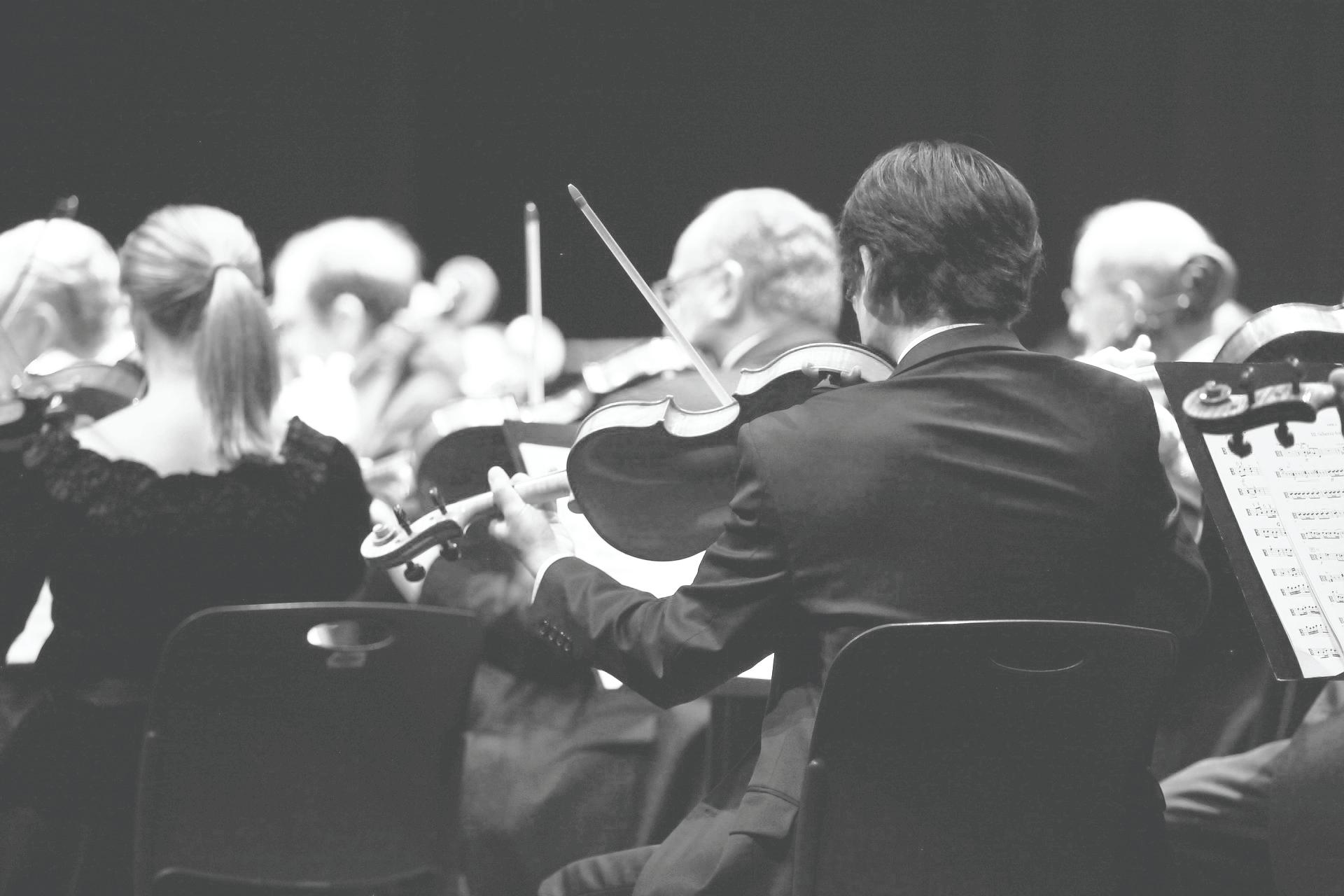
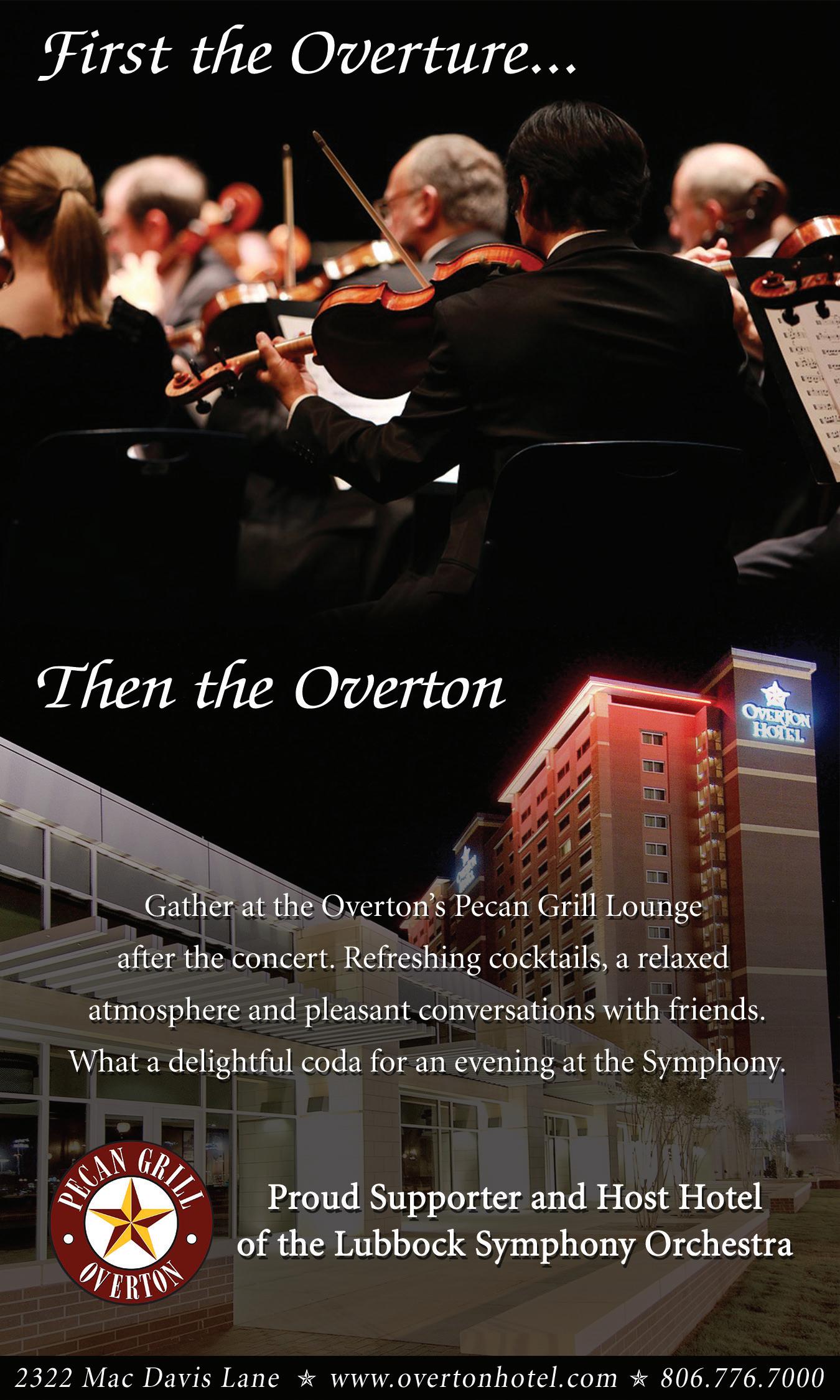
start, and it would not be entirely unkind to say it was probably Beethoven’s own fault. He advertised a concert to be given on the evening of December 22, 1808 premiering several new works – so many new works that the concert lasted nearly four hours. Add to this a bitterly cold winter evening and the occupation of Vienna by Napoleon’s troops (which kept most of Beethoven’s wealthy patrons as far away from the city as they could manage), and you have the makings of a potential musical and financial disaster. The concert was done on one rehearsal, with several pieces woefully under-rehearsed. The Fantasy for Piano, Chorus and Orchestra came to grief in the middle of the performance and had to be started again from the beginning. While Beethoven failed to reap financial rewards from the concert, and critical reviews were scathing, the few hardy souls who braved the weather and the poor performances agreed that this symphony broke new ground.
The opening Allegro con brio still astonishes in its invention, and in its relentless obsession with the four-note idea. Even the more lyrical second theme heard in the violins cannot escape an ominous reply of the four notes in the cellos and basses. The drama of the movement is heightened in the development section where the music fragments, eventually devolving to single chords volleyed back and forth between sections, occasionally interrupted by outbursts of the fournote figure. Even more unusual is the oboe solo that appears shortly into the recapitulation, and the extended coda, ending the movement with brutal finality.
The second movement Andante seems worlds away from the tension and strife of the first. It is a set of variations, with the theme first heard in violas and cellos, and presented in more and more elaborate variations. These variations are interrupted with fanfares in the key of C major, a foreshadowing of the final key of the symphony. Yet even in the opening theme we hear those four notes, in this instance sounding a gentle benediction at the end of the phrase, but linking this largely serene movement with the tempestuous Allegro con brio which preceded it.

The scherzo begins with ominous rising arpeggios in the cellos and basses, followed by a grim march. This theme, led by the horns, is – yes, you guessed it –three short notes and a longer one. The trio section is a rambunctious fugato, led by the cellos and basses. The scherzo returns, and its eerie character is enhanced by the strings playing pizzicato, with punctuations from the bassoons.
Where normally there would be a coda to end the movement loudly, Beethoven instead conjures one of the most magical passages in any symphony. Over a pianissimo timpani beat, the violins begin a melody that starts as a sigh but gradually grows in length and in confidence, like a newly-sprouted vine tentatively straining towards sunlight. The music grows in volume and strength, finally exploding into joyous C major to begin the finale. All emotional doubts are swept away, and the four-note motive chortles triumphantly in the triplet figures that abound throughout the orchestra. In another revolutionary masterstroke, Beethoven brings back a brief glimpse of the gloomy scherzo, but it is C major that wins the day, sprinting triumphantly to the final chords.


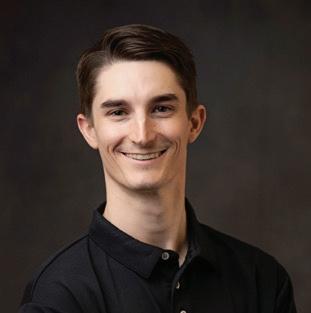
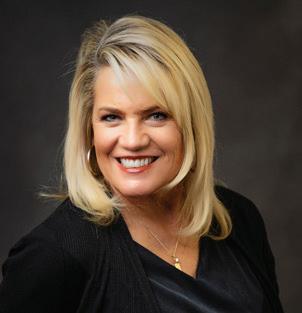
texastechalumni.org
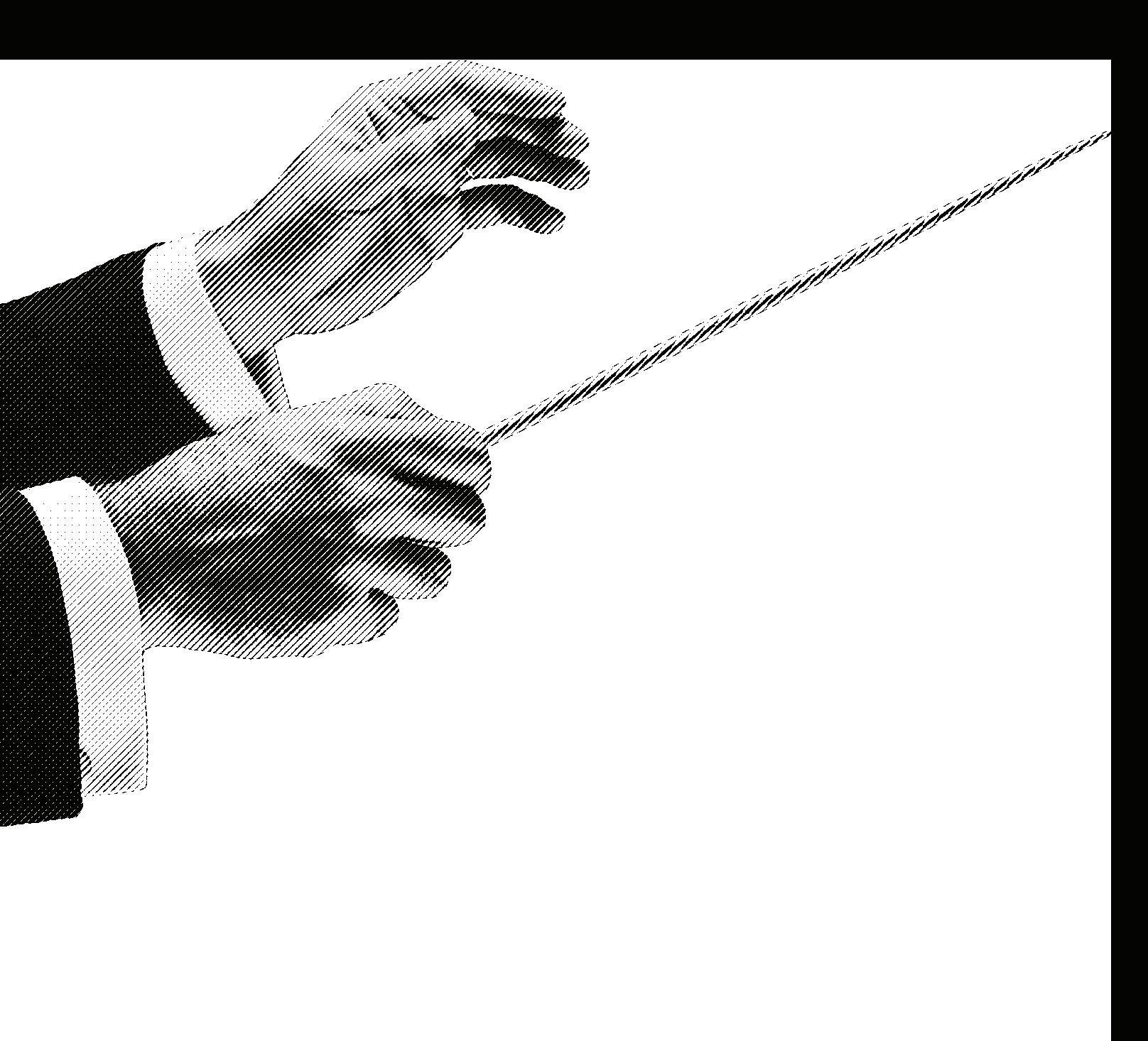


($15,000+)
Herb and Evan Armstrong
Neil and Sandra Kurtzman
Craig and Ann McDonald
Sam and Jana Scheef
Lola and Thomas Windisch
($7,500 – $14,999)
Dolle Barker
Jill and Gilbert Berdine
RADM and Mrs. Stephen Chadwick
Harold and Deena Evensky
GRACO Real Estate Development, Inc.
Mr. and Mrs. Joe Horkey
Adrian and Leslie Huckabee
Hill & Ioppolo Oral & Dental Implant Surgery of Lubbock
Thivakorn and Betsy Kasemsri
Jan Ledbetter
JF Maddox Foundation
Toni E. Wallingford
($5,000 – $7,499)
Jane Baker
Joan Baker
Dr. Mounir and Mrs. Leen Borno
Eugene and Covar Dabezies
Michael Epps
Jo Anne M. Smith
($3,500 – $4,999)
Sandy and Alan Henry
($1,500 – $3,499)
Mark and Betsy Bass
Ray and Cathy Box
Terri and Mike Byrne
David Cho
Deborah Conn
Elias and Eleonora Ghandour
Elgin and Erin Gregg
Amy Grisham
Dr. Bess Haley
Tommy and Lavelle Hawkins
Dr. and Mrs. Jack and Jane Henry
Mark and Heather Hocker
John and Cherie Hunter
Virginia Kellogg
Robert and Stacey Kollman
Larry and Lucy Landusky
Mr. and Mrs. Robert Lin
Jim and Patti Lupton
Rick and Sharon Martin
Drs. Barent and Audrey McCool
Ms. Mary McCrary
Mallory Miller
Judy and Gary Poffenbarger
Melissa and Tim Pridmore
John and Katie Salter
Kevin and Carrie Sedberry
Dr. and Mrs. Davor Vugrin
Mr. Jon Walter
Dr. Charles and Patricia Wheeler
Brian A. Willcutt
Noelle Zavala
($1,000 – $1,499)
Joshua Allen
Dwight Andrews
Beth Ashmore
Stephen and Maria Balch
Dustin Baucom
Blayne Beal and Monty Long
Mr. Anthony and Dr. Helen Brittin
Patty D’Alise
Joan and Joe Dominey
Stephen and Kathy Faulk
Patricia Freier
Brad and Birgit Green
Mr. David Harmon
Dennis and Ellen Harp
Family Owned Since 1931

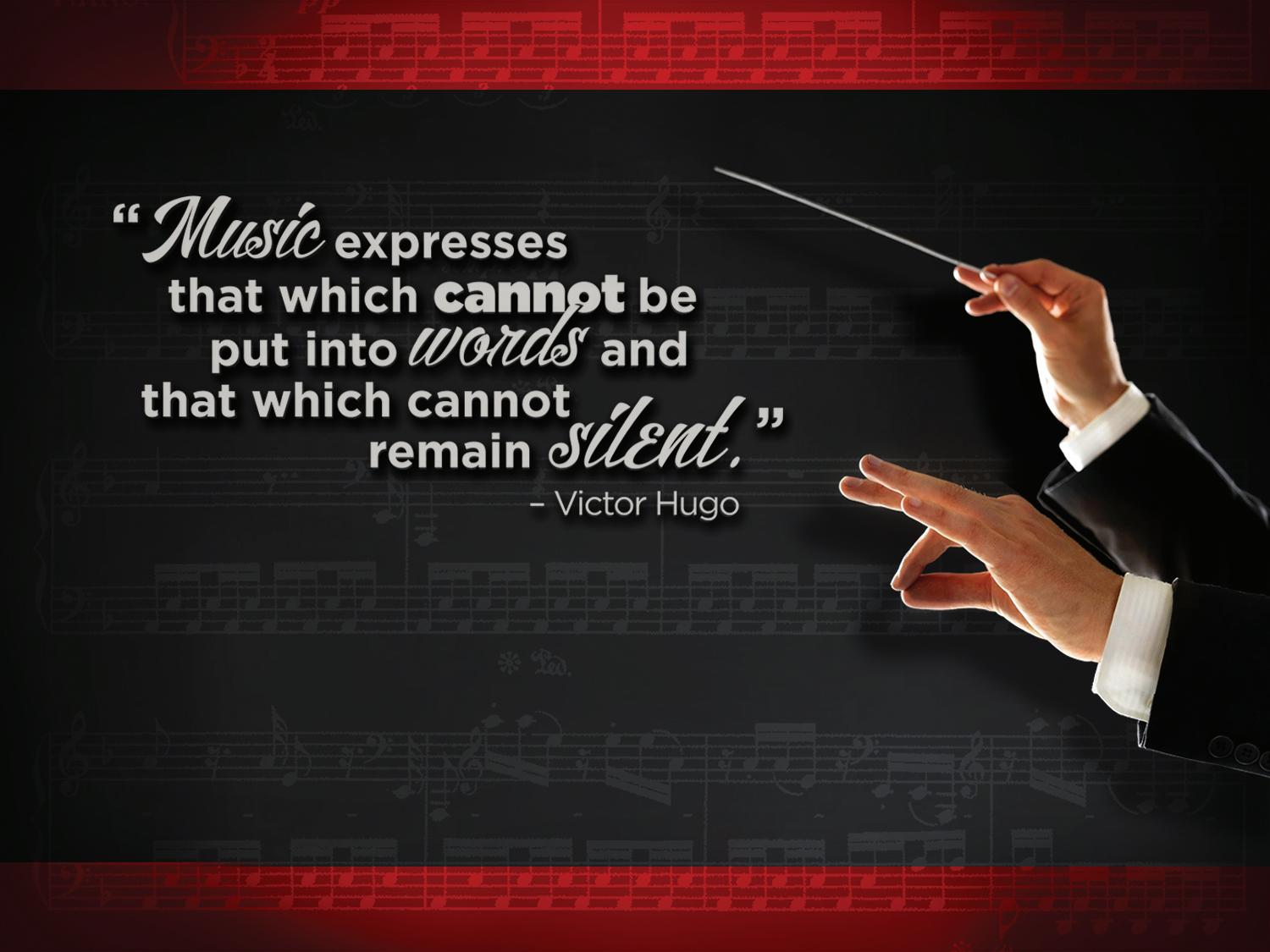

Karen and Mark Havins
Ross and Kelli Hilburn
Honorable and Mrs. Phil Johnson
Melissa Lewis
Kurt and Paula Loveless
Peggy and Terry McInturff
Ms. Amanda Mead
Mary Moran
Curtis and Brenda Parrish
Mrs. Dona Richardson
Judy Rowdon
Tim and Mary Jane Sampson
Dr. Phil Sizer
Steve and Robin Talbert
Drs. Roger and Nadene Tipton
($500 - $999)
Pieter Bergstein
Aubrey and Ruth Ann Bridges
Mr. David Buckberry
Bryan Camp and Susan Gillette
Mr. Barry Cohen
Richard and Reyhan Crider
Bob and Sandy Crosier
Jim and Patti Douglass
Mr. Stephen G. Fannin
Giles and Lynn Forbess
Barbara Hataway
Janeen Drew Holmes
Don and Lynnita Hufstedler
Dr. Cynthia Jumper and Dr. Reid Norman
Morris and Janice Knox
Lucy Lanotte
Tom and Gwen Nichols
Gerry & Jamie Nystrom
Norman and Bettie Orr
Mike and Melanie Ragain
Tommy and Tina Sansom
Jill and Fred Stangl
Sandra Stratton
Marbella Tran
($275 - $499)
Ian and Shelley Barba
Claudia and Mark Griffin
David Hodges
Mr. Robert Jokisch
John Jones
Wendell Leatherwood
Mark McBrayer
Laura and Monte Monroe
Sally Murray
Jill Nelson
Davis and Janet Price
Stephanie Starkovich
Michelle and Jon Stephens
Betty Wall
Dr. and Mrs. Hugh Wilson
Mrs. Gay Word
Ms. Martha York
Debby and Dennis Zuehlke
($125 - $274)
Alexis Anderson
Mrs. Nancy Barr
Mr. Keith Bearden
Edward Broome
Matthew and Krista Bumstead
Dana Butler
Jeff Butterfield, MD
Manon and Neill Carter
Mary Cato
Mrs. Bobbe Crawford
Charles Croessmann
Carol Daugherty
David and Claudia Dea
Sara and Tim Dodd
Sherri Field
Sharon & Rick Graves
Marion Hagler
Terry Hawkins and Doug Klepper
Mr. Larry Hess
Mary Iyer
Brian Kendall
Randy Kinnison and Jane Rowley
Wyatt and Claire Leavell
Gary and Judy Linker
Ben and Robin Lock
Ms. Sara McLarty
Linda and George McMahan
Betsy Morton
Kathy Owens
Tom and Sarah Parsons
Trois Payne

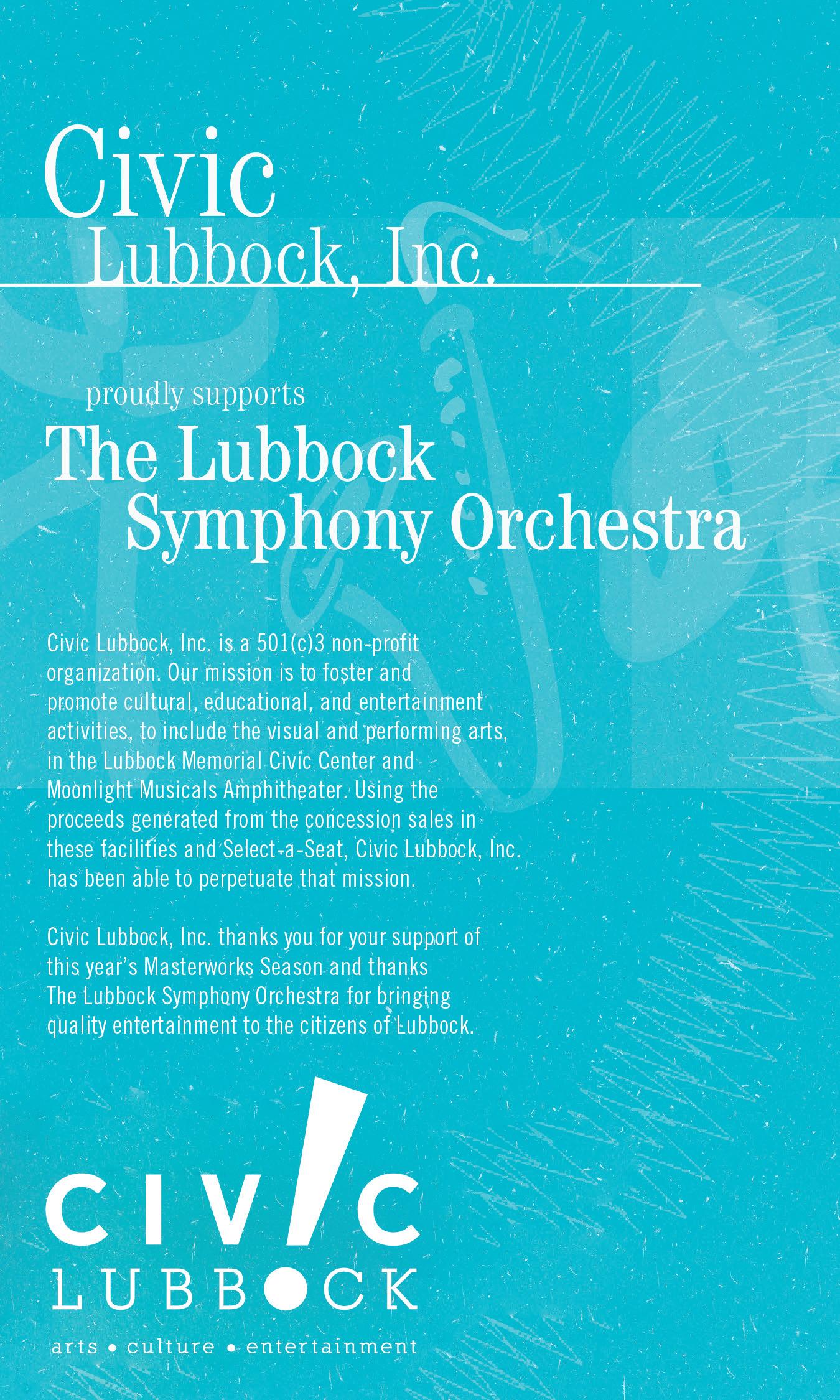
Gerald Pipkin
Peter Reed
Karen Savage
Lynn Schmidt
Melanie Sorsby
Mrs. Sue St. Clair
Steve Synck


Ralph Tamper

Tom Tenner
Sue Ann Thompson
Kathleen Turner
Jenny and Edson Way
Jimmy and Susan Wedel
Tim and Amanda Wooten

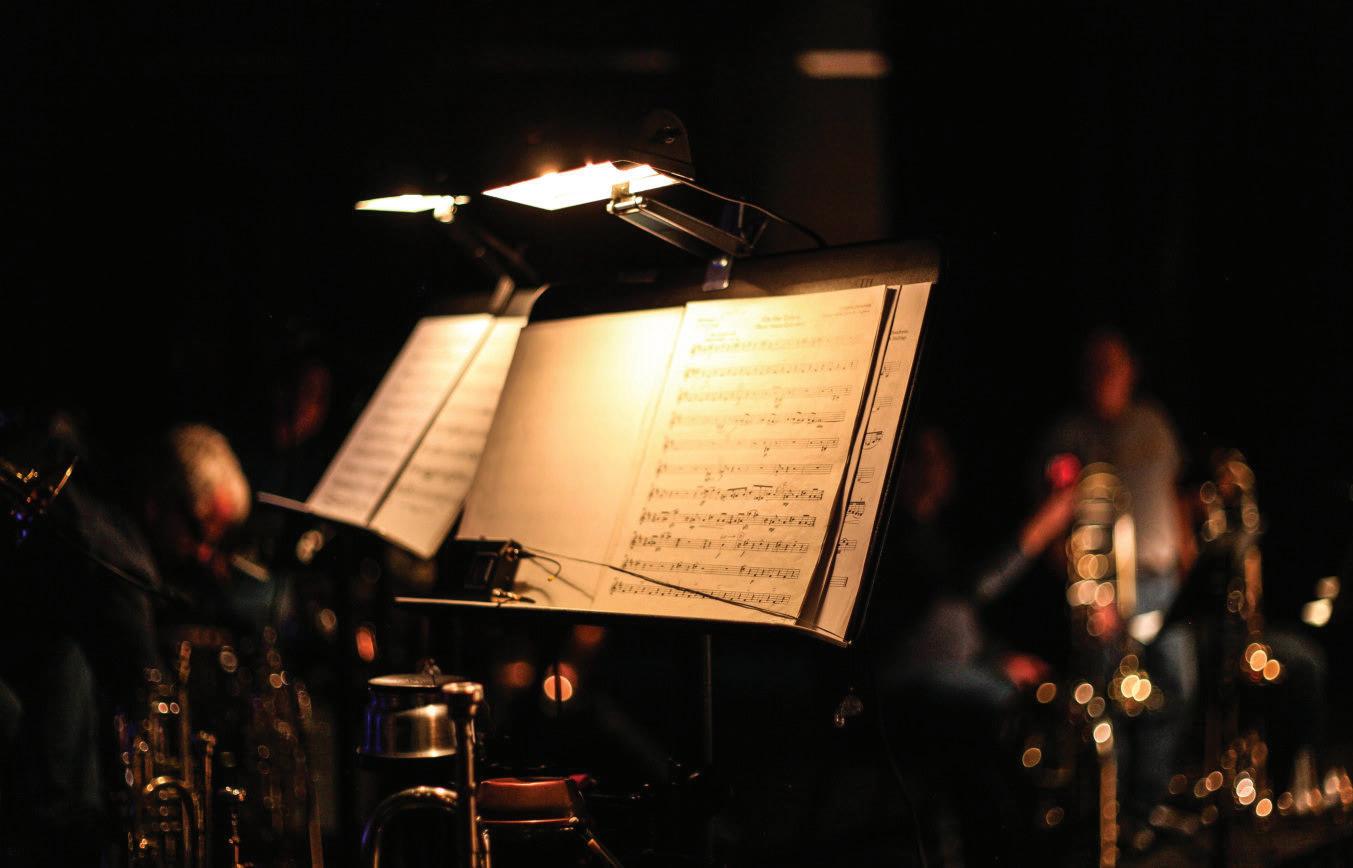

The Lubbock Symphony Orchestra respectfully acknowledges donations received from February 8, 2022 and August 8, 2023 in honor of the following:
Memorials:
Norton Baker
Dr. Eugene Dabezies
Lou Dunn Diekemper
Mary Epps
David and Beebe Fields
Lynnita Hufstedler
H.E. Prince Bira Kasemsri
Don Wade Ledbetter
Shelley Furr Nelson
Ricky Rasco
Honorariums:
Kea Beasley
RADM Stephen K. Chadwick
David Cho
Joan and Frank DeCelie
Terry & Peggy McInturff
Toni Wallingford
Kalitsa and George Zias
If you would like to honor an individual or organization important to you, please send your tax-deductible donation to the Lubbock Symphony Orchestra, 601 Avenue K; Lubbock, TX 79401.
The Lubbock Symphony Orchestra Endowment Trust
The CH Foundation Conductor’s Podium Endowment
Helen DeVitt Jones Endowment for Education
LSO Endowment for Musician Fees and Education
Shelley Hall Nelson Endowment for Musicians’ Salaries
Lubbock Symphony Opera Fund
Texas Tech University J.T. & Margaret Talkington College of Visual and Performing Arts, School of Music Performer Endowment
Jones-Saathoff Family Concertmaster Endowment
Diekemper Family Foundation Associate Concertmaster Endowment
Justice Phil and Carla Johnson Principal Second Violin Endowment
Mary M. Epps and Ralph E. Wallingford Principal Viola Endowment
Mary Francis Carter Principal Cello Endowment
Eugene and Covar Dabezies Principal Bass Endowment
Drs. Audrey and Barry McCool Principal Flute Endowment, in memory of the Crew of Columbia, STS-107
Lubbock Symphony Guild Principal Oboe Endowment
Janeen Drew Holmes English Horn Endowment
Christine Polvado and John Stockdale Principal Clarinet Endowment
Nancy and Tom Neal Principal Bassoon Endowment
Anthony and Helen Brittin Principal Horn Endowment
Stacey and Robert Kollman Family Principal Trumpet Endowment
Larry and Lucy Landusky Principal Trombone Endowment
Tim and Mary Jane Sampson Bass Trombone Endowment
Diekemper Family Foundation Principal Tuba Endowment
Lubbock Symphony Guild Timpani Endowment
Lisa Rogers/Alan Shinn Principal Percussion Endowment
Rachel Jean Armstrong Thomas Principal Harp Endowment
Edward R. and Jo Anne M. Smith Principal Piano Endowment
Proud

Jack M. Lewis
W.P. Clement
Charles E. Maedgen, Jr.
Roy Bass
Rex Webster
Marion Key
W.R. Sewell
J.C. Reynold
James L. Quicksall, Jr.
Asher Thompson
Richard G. Richards
Jack Kastman
Joe J. Moise
J. Harmon Jenkins
George C. Miller
Lonnie Langston
John Witcomb
O.W. English
Asher Thompson
Troy Myers
Arthur E. Gamble
Charley Pope
C.B. Carter
Robert E. Norris
Dean James Allen
Robert L. Stripling
Charley Pope
John R. Kreiger
Roger Key
Edwin E. Merriman
Owen McWhorter, Jr.
Frank Newton
Frank Anderson
Kay Sanford
Paul Meyer
Robert L. Stripling
Jim Ratliff
Coffee Conner
Alan Henry
William D. Armstrong
Susan Boling
Curtis Griffith
DeWayne Pierce
Mike Cunningham
Margaret Lutherer
Chris Barnette
Catherine S. Porter
Ray Fargason
Emily Ratcliff
Brad Green
Peter G. Daia
Kirk McLaughlin
Harry Zimmerman
Shannon Taliaferro
Heather Hocker
Brian Willcutt
LSO is grateful for the generous support of the following foundation, community, and public partners.
Affordable Storage
Alan Henry Insurance
ALLIANCE Credit Union
All Saints Episcopal School
Anderson Bros Jewelers
Atmos Energy
Ballet Lubbock
Benchmark
Betenbough Homes
Bolinger, Segars, Gilbert & Moss, LLP
Brandon Guitar Studio
Bruckner Society of America
Carillon
Chicken Express
City Bank
Cleaning Services of Lubbock
Community Foundation of West Texas
Covenant Health
CRI
Diekemper Family Foundation
D. Williams & Co.
Drest by Scott Malouf
Evelyn M. Davies Foundation
Evensky & Katz / Foldes Wealth Management
Farnsworth Family Orthodontics
First United Methodist Church
Ghandour, Elias M.D., P.A.

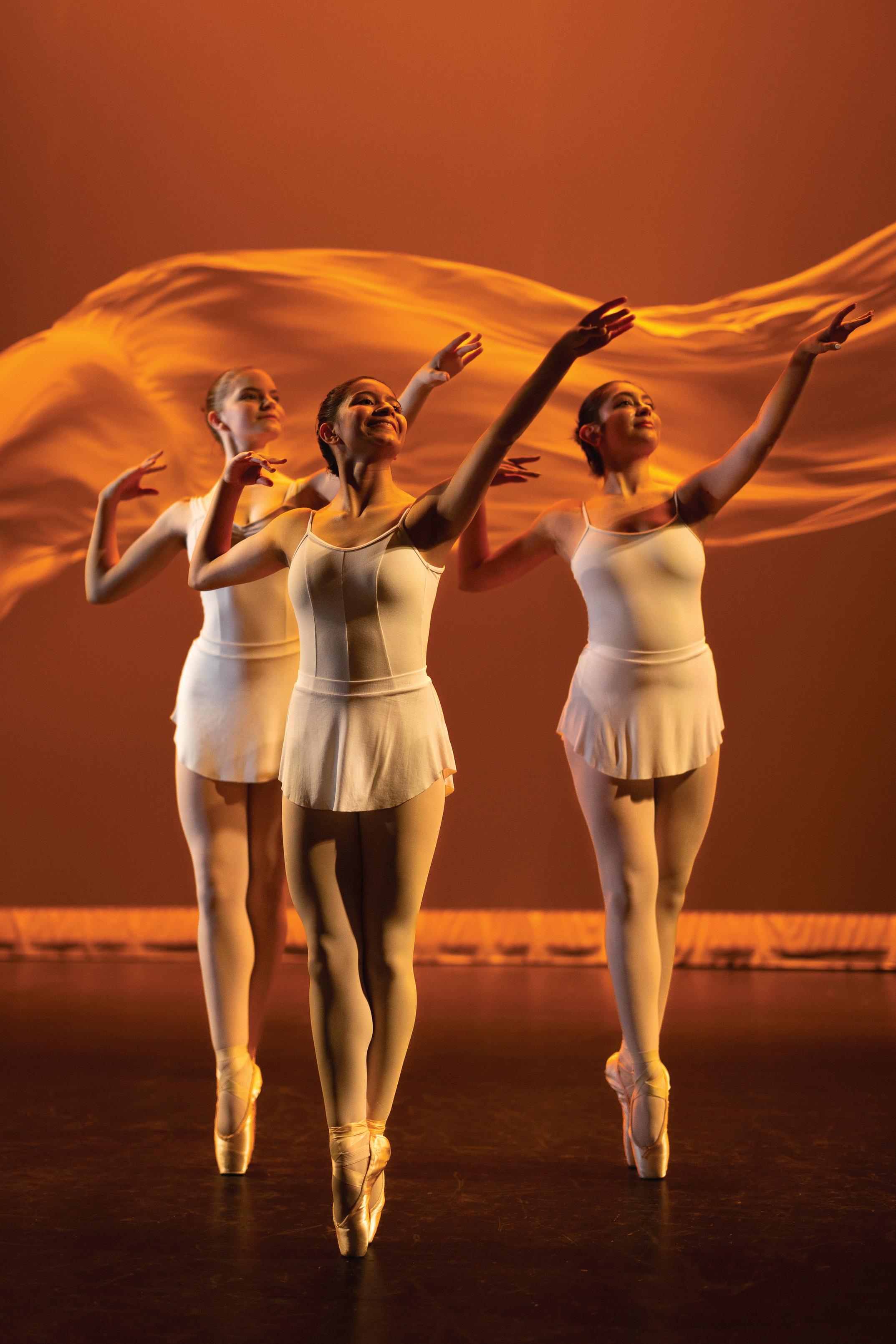


Community Partners, cont.
GRACO Real Estate Development, Inc.
Happy State Bank
HCHT
Helen Jones Foundation
Hill & Ioppolo Oral & Dental Implant Surgery of Lubbock
KCBD
KTTZ 89.1 FM
Kuykendall Foundation
La Posta Botique
Lee Lewis Construction, Inc.
Llano Estacado Winery
Lone Star State Bank
Louise Hopkins Underwood Center for the Arts
Lubbock Abstract & Title Company
Lubbock Animal Care Clinic
Lubbock Arts Alliance
Lubbock Avalanche-Journal
Lubbock Chorale
Lubbock Community Theatre
Lubbock Entertainment Performing Arts Association
Lubbock Moonlight Musicals
Lubbock Music Club
Lubbock Music Teachers Association
Lubbock National Bank
Lubbock Youth Orchestras
McPherson Cellars
Merrill Lynch
MS Doss Foundation
MWM Architects, Inc.
Officewise Commercial Interiors
Orlando’s Italian Restaurant
Otto’s Granary
Overhead Door Co.
Overton Hotel & Conference Center
Parkhill, Smith & Cooper
PayPal
Pediatric Associates of Lubbock
Pennington, Bass & Associates
Phi Beta Kappa Assn. of West
Texas & Eastern New Mexico
Endowment to Benefit
LSO Youth Outreach
Pinkie’s
Plains Capital Bank
Prosperity Bank
Rea Charitable Trust
Robinson & Malone
General Dentistry
Sanders Funeral Home
Service Title
Sharon Mirll, Exit Realty
Sherick Memorial Home
South Plains College
Southwest Snow Services, LLC
Spec’s
St. Clair & Massey Orthodontics
Stewart Title
Tarpley Music
Texas Commission on the Arts
Texas Tech Alumni Association
Texas Tech Club
Texas Tech University Presidential Lecture & Performance Series
Texas Women for the Arts
The CH Foundation
Tif Holmes Photography
T L C E Charitable Fund
TTU eLearning
TTU School of Music
TTU Talkington College of Visual and Performing Arts
TTU Theatre and Dance
United Supermarkets
University Medical Center
Yellow House Dental & Implant Center
YWCA


Toni Wallingford Chair
Jill Stangl
Chair Elect
Melissa Lewis Treasurer
Terri Byrne Secretary
Brian Willcutt
Immediate Past Chair
Beth Ashmore
Dolle Barker
Dustin Baucom
Gilbert Berdine
Leen Borno
Kasi Boutwell
Maureen Chadwick
David Cho
Covar Dabezies
Patty D’Alise
Michael Epps
Stephen L. Faulk
Patty Freier
Karen Gibson
Gurdev Gill
Brad Green
Erin Gregg
Amy Grisham
Bobbye Hrncirik
Leslie Huckabee
Alena Ilyushyna
Carla Johnson
Tiva Kasemsri
Amanda Kuhn
Neil Kurtzman
Grace Lin
Paula Loveless
Mallory Miller
Mark Morton
Brenda Parrish
Judy Poffenbarger
Melissa Pridmore
Peter Reed
Stephanie Rogers
Katie Salter
Tim Sampson
Phil Sizer
Andrew Stetson
Robin Talbert
Davor Vugrin
Darya White
Joyce White
Lola Windisch
Galen Wixson ADMINISTRATION
Galen Wixson
President & CEO
David Cho
Music Director
Eric Allen
Lubbock Chamber Orchestra
Conductor
Kea Beasley
Director of Education
Courtney Jordan
Director of Development
Corey Dolter
Operations Manager
Emily Gavaghan
Director of Marketing
Vaughan Hennen
Librarian
Gary Hudson Personnel Manager
Amelia Jamieson
Graphic Designer
Ryellen Joaquim Librarian Intern
Suzanne Rasco
Director of Accounting
Jamie Shipp Education Assistant
Nia’ Threatt Box Office Coordinator
Callie Watson
Graphic Design Intern
Thank you for attending tonight’s performance. We appreciate your support of the Lubbock Symphony Orchestra. The 2023-2024 “Best Of” season promises to be an outstanding year of symphonic music presented by Maestro David Cho and your Lubbock Symphony Orchestra.
Tonight’s performance, and every performance since 1952, has been made possible in part because of the support provided by the Lubbock Symphony Guild. For 71 years, Guild members have donated their time, talent, and resources to keep symphonic music thriving in our community.
If you appreciate the talent of our Orchestra and value the educational and cultural contributions provided to Lubbock and West Texas, I invite you to consider becoming a member of our Guild. For more information, please visit our website at www.LubbockSymphonyGuild.com.

Sincerely,
 Stephanie Rogers, President Lubbock Symphony Guild
Stephanie Rogers, President Lubbock Symphony Guild
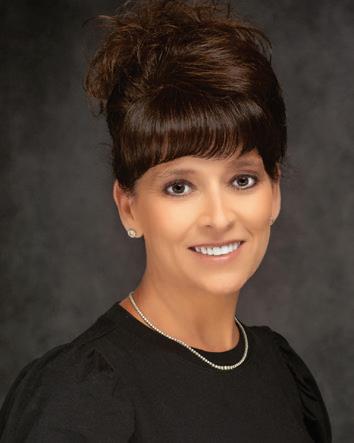
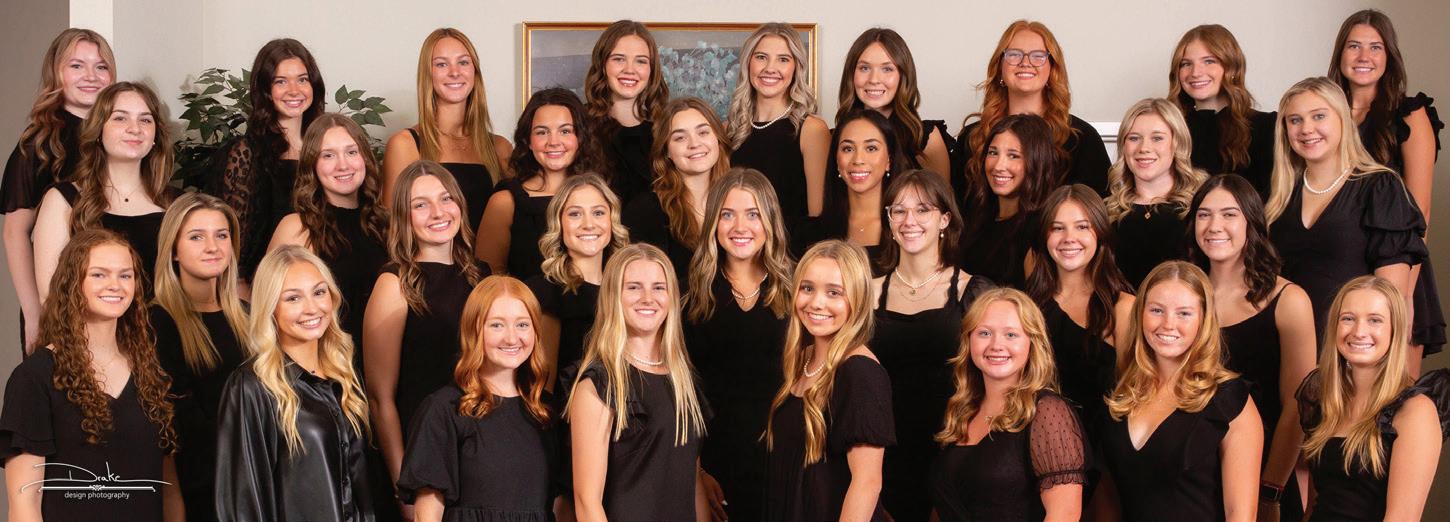
Front Row Left to Right - Christiana McCourt, Jewel Naegele, Avery Schilling, Olivia Needham, Annabelle Bennett, Anna Everett, Emme Hocker, Kathryn Kothmann
2nd Row Left to Right - Jessica Foley, Campbell Carper, Alayna Bayouth, Preslee Edwards, Hannah Feist, Emma Feist, Claudia Tepper
3rd Row Left to Right - Alexandra Dannemiller, Kendall Cathey, Kate Cardelli, Jillian Jones, Emeri Tran, Reghan Rose, Ava Campbell, Jeye Johnson
Back Row Left to Right - Lydia Carter, Berkley Bird, Ella Scolaro, Madison White, Skylar Tidwell, Kennedy Venable, Ava Lansdell, Mia Capodagli, Olivia Phillips
Not Pictured - Mya Ballou, Addison Burnett, Hannah Cooper
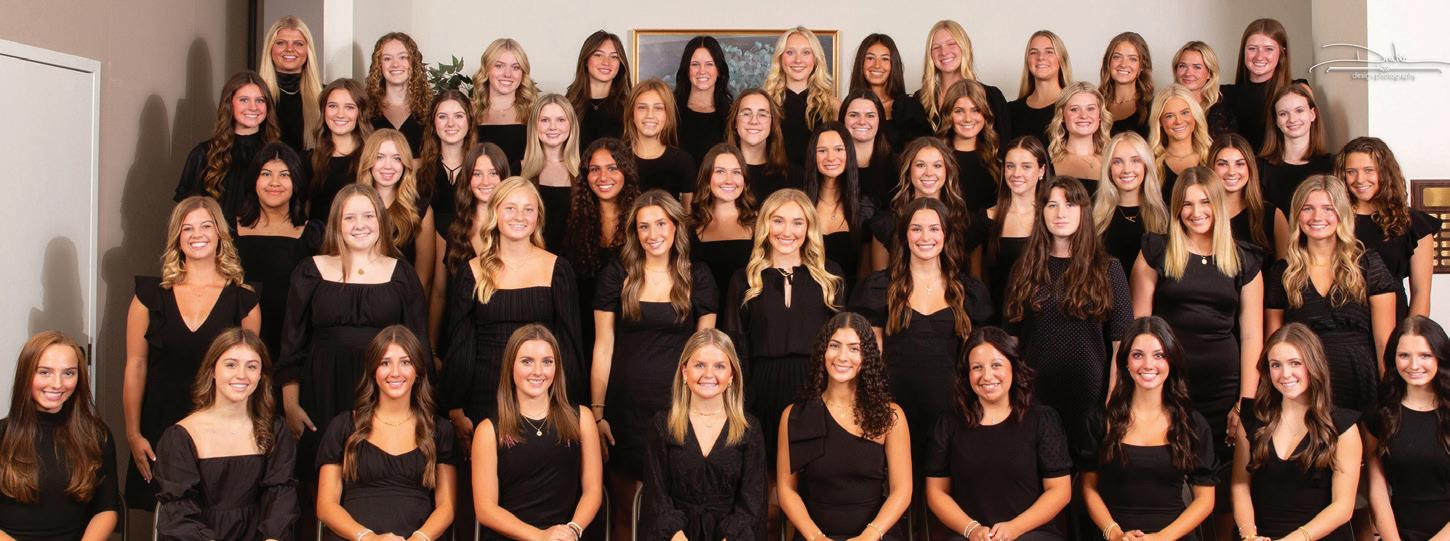

Seated Left to Right - Anne Edwards, Olivia Elliott, Rylee BeVa Rose, Tierni Green, Sadie Callison, Maya AI-Hmoud, Jayci Lentz, Camden McDougal, Raegan Reed, Reece Watson
Front Row Left to Right - Hope Hancock, Hannah Harvey, Bella Lampe, Maya Vermillion, Remington King, Addison Kitten, Ashlyn Simek, Riley Newberry, Raegan Lee
2nd Row Left to Right - Gabrielle Scherpereel, Emily Roark, Emory McCain, Teema Sharif, Ella Murphree, Reece Riddle, Jencee Thompson, Grace Gerwig, Aubrey White, Susannah Smith, Lydia Pesterfield
3rd Row Left to Right - Brentley Preston, London Carlisle, Elizabeth Johnson, Lauren Casey, Kristen Mitchell, Kamryn Chandler, Madelyn Caswell, Blair Belew, Ashlee Jones, Zimri Buckley, Claire Ancell
Back Row Left to Right - Ella Grace Bennett, lndie Williams, Viviana Ziegner, Ella Mendez, Camryn Howe, Rylan Belle Raley, Mia Chacon, Bryleigh Norman, Hannah Pharies, Anastyn
Greaser, Sydney Smothers, Cora Clifford
Not Pictured - Emily White, Haleigh McKee, Cambelle Fannin, Ryann Grissom, Morgan Parker, Taylor Harrison, Brynlee Hogg, Olivia Mudd
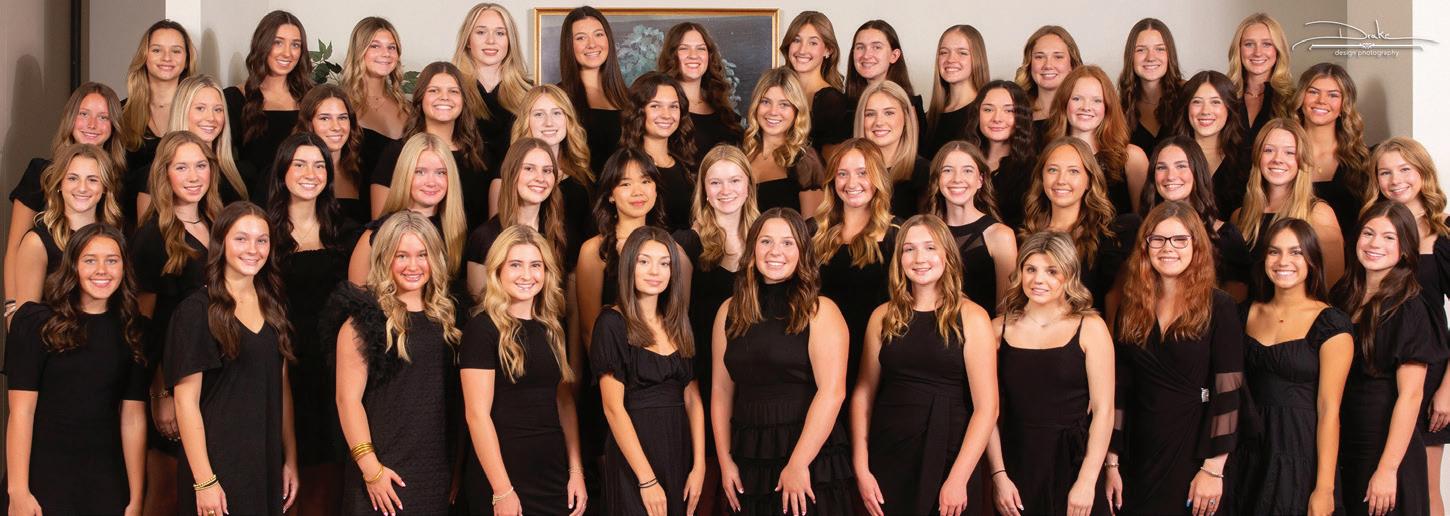
Front Row Left to Right - Ashlyn Edwards, Emyrson Parrott, Blakeley Martin, Payton Reed, Reya Felton, McKanna Garcia, Lauren King, Brynlee Smith, Heidi Helderlein, Joleigh Reno, Chayce Johnson
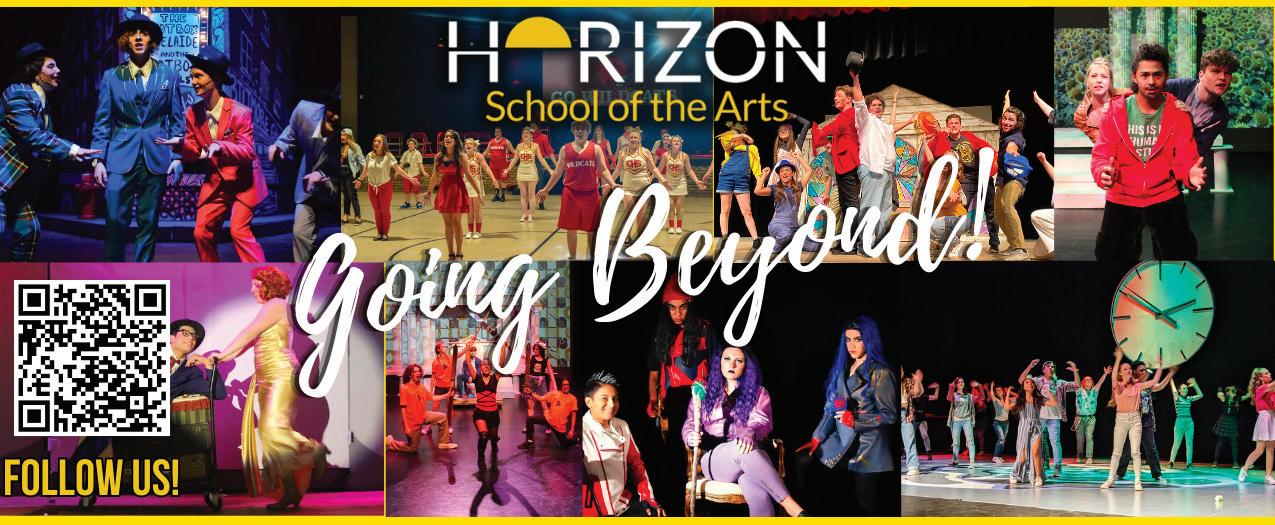
2nd Row Left to Right - Chayce Welborn, Sarah Simpson, London Bird, Natalie Sweat, Erin Brodbeck, Angelia Liu, Kathleen St. Clair, Alice Everett, Talitha Dalton, Georgia Kitten, Baylee Fillingim, Cassidy McKinnon, Sadie Gillespie
3rd Row Left to Right - Meridith Bradley, Addison Stewart, Campbell Franklin, Elizabeth Nicholson, Kennedy Cowan, Ava Smith, Adelaide Underwood, Katelyn Glenn, Campbell
Beeler, Katelyn Bollens, EllaMaria Webb, Ellie Underwood
Back Row Left to Right - Sofia Martinez, Halley Reynolds, Finnley Forero, Landry Allen, Addison Neufeld, Danelle Mccourt, Joy Wischmeyer, Harper Burrell, Emma Lane, Madison
Heider, Elly Norris, Emery Fox

